#to be aware of which ideas are actually present in the movie vs. which ones are just fanfiction
Text
wanted to just ramble on about bayverse 2: electric boogaloo for a minute because it actually has a pretty good plot (buried under some questionable directing and writing) that i don’t think we often get much of in terms of tmnt plot.
and that’s the whole purple ooze situation they’ve got going on. donnie discovers this chemical that could, in theory, turn them human. donnie shows this off to leo with upmost enthusiasm that he’s just gonna be like “omg yes gather everyone rn and inject that shit into me YESTERDAY” because.. yknow. they’re mutants. they live in a sewer. away from society. this is their big chance to get away from all of that and live an actual “normal” life.
but leo is very quickly against that. he’s dismissive (because bayverse leo is moody dialled to eleven) and as soon as he’s aware of what donnie has here, he almost instantly instructs him to keep this a secret from raph and mikey. because he knows the ramifications of them finding out about this.
and of course mikey and raph find out and are understandably pissed (the scene where raph really strongly sticks up for mike fighting for his right to have a vote really strikes me - it’s almost like he actually cares more about it being held a secret from mikey than it is from him and that highlights how much he knows it means to his little brother. raph is a good egg) and then for a good chunk of the movie we have leo + donnie and mikey + raph kinda just.. doing their own thing.
and usually tmnt will give us the traditional A Team vs B Team which consists of leo + raph (usually for the whole bickering/arguing/coming together tie in) and then mikey and donnie just doing whatever. (not saying that sometimes they feel like props but. sometimes they do feel like props)
but i think the movie actually benefitted from splitting the team up differently here. we get a whole other dynamic that we’d usually see in perhaps a handful of episodes in some of the shows (my mind goes back to the leatherhead ep from 2k12 when we get a leo + raph + donnie team up mission without mikey and donnie is therefore instantly reduced to the little brother of the group and i LOVED that. i wish we got more of that because that particular dynamic was really fun to watch)
and this switch up especially makes a difference for poor donnie who wasn’t really totally on leo’s side, mostly because he too wanted to use the ooze, but kinda just got roped into being on his side without really a choice kinda like he’s the unfortunate child of divorce caught in the crossfire lol
but it’s also interesting that raph would have wanted to make the change when presented with the opportunity. in other iterations, it’s heavily implied that he’s somewhat content with the life he has. he enjoys his undercover lifestyle and he’s not really fond of humans in the same with his brothers are. (cue 2k12 raph scoffing “ugh. humans are so annoying” like he doesn’t have 2 that’re his friends lol)
but mike and don? fascinated by the human world. they crave a reality where they can just walk about amongst humans and live like them. even in the idw power rangers crossover issue where they use clocking broaches, it’s leo and raph who are somewhat anxious about the whole thing where mikey and don are instant game.
so to have raph part of this as well as the other two is really interesting. and whether that was just included in the plot to give him some reason to be fighting against leo, that’s neither here nor there. raph wants that too, for himself and for his brothers too. i think that if mikey and donnie weren’t on board with it, raph wouldn’t be either. he’d go along with being human if it meant making his little brothers happy — if it meant living a better life with them instead of being stuck underground without them. whereas it’s just leo who is reluctant. whether it’s a fear or the unknown or change or whether he’s just so okay with where his is.. he’s the only one that doesn’t think it’s a good idea. and as a result, he takes away the others choice which of course kicks off that whole plot line.
and it looks like mutant mayhem will touch upon this (this time it looks like all of them want in on being part of the human world) and i think that it’s just a really interesting plot point part of the tmnt franchise. being mutants and living in a sewer is all they know, but catching glimpses of a life they could have but can’t have? especially at an age where you’re trying to discover yourself and find who you are? i just hope this new movie pulls it off well if not as well as i think the bayverse movies touched upon it.
#why am i ranting about bayverse turtles on a sunday night you may ask?#well………. i don’t actually know#anyway. lmao#tmnt bayverse#tmnt Leonardo#tmnt Raphael#tmnt donatello#tmnt michaelangelo#teenage mutant ninja turtles out of the shadows#tmnt meta
26 notes
·
View notes
Text
My idea for a potential DEATH BATTLE! #7
2023, Nov 28, 29, Dec 1, 2
PREVIOUS POST: SIXTH POST
MASTER LIST
Darth Sidious vs Master Xehanort (Star Wars vs Kingdom Hearts)
Which evil wizard of darkness behind the curtain will prevail?
FIGHTER 1: Darth Sidious, the sadistic and mean megalomaniacal mastermind behind the Galactic Empire.
FIGHTER 2: Master Xehanort, the darkness-seeking body-snatching chess master of Kingdom Hearts.
Wiz: The evil mastermind. The malevolent entity behind the curtain. One of the greatest evil is the one that presents itself as a friend. It leads to the demise of many heroes.
*CLIPS: Evil mastermind: James Moriarity. The malevolent entity behind the curtain: MHA's All For One. Evil fakes being friendly: the ego Death scene from Guy Ritchie's Revolver (Watch that movie, it's cool).*
Boomstick: These two may be geriatric, but they've put their wits to use and have formulated an entire chess plan to carry out their dreams and designs and are just as strong to boot. He's Wiz and I'm Boomstick.
Wiz: And it's our job to analyze their weapons, armor, and skills to find out who would win... a Death Battle.
PREFACE (What to know): I am fully aware of how popular this MU is, with its 2021 DBX and its high-ranking position in 2023's Champion Poll, so I wanted to get this out before it becomes an actual episode. I wanted this MU since I played KH: Birth By Sleep in April and May 2020 since the lockdown had started and I had a collection of KH games to play. There is a large collection of Star Wars media and there is the old Legends content to consider alongside the vast history of Kingdom Hearts, so I will try to be careful with how I treat these characters, but as usual, my efforts will go into the "fight" more than anything else. If I am to consider them at their max, then we have Palpatine at the end of the Skywalker Saga and Xehanort with the χ-Blade. I WILL BE TREATING THIS AS A SEASON FINALE because of how much there is to go over for both characters and because it would serve as a beautiful contrast to Yoda vs. King Mickey: one season starts with the light and another ends in darkness. Also, I wanted this to be my 13th suggestion, but I should get this out before DB! beats me to it.
WHY:
Connections (What do they have in common):
1. Both are the main antagonists of the first saga of their series, The Skywalker Saga and the Dark Seeker Saga. (As of me writing this, the main series of SW and KH is those two sagas).
2. Both have concocted master plans in which they would spread their influence insidiously across reality, namely through manipulation and subordinates while maintaining a guise of reliability. Darth Sidious trained Darth Maul, turned Anakin into Darth Vader by manipulating his fear, and used his identity as Chancellor Palpatine to further his political career and deceive his way into accomplishing his goal of orchestrating the fall of the Galactic Republic and the Jedi Order through the Clone Wars, and then established his reign over the galaxy while Master Xehanort manipulated Terra who trusted him as a teacher into killing Eraqus as well as Ventus through Vanitas to create an ultimate weapon and Riku by exploiting his wishes to explore the outside worlds and even Maleficent. He also created Organization XIII to prolong his life.
3. Both are known for how they cheat death. Palpatine had his clones and attempted to possess Rey's body whereas Xehanort body-snatched Terra, had his Nobody, Heartless, and Organization XIII as his vessels, and even had a time-traveling younger self.
4. Both have dabbled in scientific or science-like research. Palpatine is mostly known for his experiments in Sith Alchemy and Xehanort is mostly known for the creation of the Nobodies and the mass release of Heartless. These are not their only contributions, but I am not listing all of them.
5. Their goal was to have ultimate power in some form. Palpatine wanted supreme control over every being in the galaxy and Xehanort wanted to conquer Kingdom Hearts to obtain ultimate power/knowledge and recreate the worlds the way he saw fit.
6. Both are among the most dangerous warriors trained in their respective ancient ways (Sith ways + the Dark Side of the Force, and Keyblade mastery + Darkness), if not, they are flat-out the most dangerous. Despite that, their greatest attribute arguably is not their strength or their tenacity to see their dreams come true, but their manipulation of others.
Personal reasons (Why I want this battle/like this MU): Back in March and April 2020, I played KH II, BBS, and 0.2 A Fragmentary Passage, and then I played DDD and watched Back Cover. Needless to say, I noticed similarities between KH and SW, namely comparing the plots of BBS & Revenge of the Sith, Terra & Anakin, Xehanort & Palpatine, and the plans of the antagonists. Shortly after, I watched this video, this video, and this video and then looked up more stuff online and found this beauty by Naitsabes89:

Since then, I tried to get a very good friend of mine who's into Star Wars to play KH, crowned Grand Master Yoda vs. King Mickey as my favorite DB!, and listened to BY's "Destined for Darkness", "Birth By Exile", "This Heartless Empire", and Skye T.'s "Insidiosa Tenebrae", none in that specific order. There was also an old article that mentioned how Nomura was wearing his love for Star Wars on his sleeve and how both had a giant conflict that wiped out the ancient wizard knights, namely the 100-Year Darkness and Keyblade War, but I can no longer find it. I also really want to add to DB!'s collection of great SW episodes of the 2020s: 2020's Obi-Wan, 2021's Yoda, 2022's Boba Fett (I wouldn't call it great, but I did enjoy it a lot), and 2023's Darth Vader.
Also, I want their personalities to play off each other: the cunning masterminds trying to coax and manipulate the other to fall into a trap while showing off merciless power.
More than anything, this is my most wanted matchup.
THE FIGHT:
Art and animation: Easy; make it 3D like the DBX and all Star Wars episodes since 2020. 2D may be easier, but the grandiosity of the characters and the matchup demands something of great animation. I do not mean to disrespect the 2D/sprite team considering the phenomenal work from just 2023 alone, but 3D models can allow for more fluid movement and better blade-to-blade combat. If possible, get DevilArtemis again and take inspiration from The Clone Wars' lightsaber duels and high-tier KH III combos (I will do my damndest to do the same).
Possible setup: Cue the Death Star, floating in space, with ominous music and equally ominous vocals. We see the two combatants playing chess like Eraqus and Xehanort in KHIII, both doing their iconic smirks/evil grins; shenanigans are afoot.
"I am disappointed you declined my offer to rule the galaxy with me. Your power and wits would make for an excellent emperor." Palpatine hates how that sounds, but he doesn't stop the smirk; he has a plan, but he does respect the power and wits of his adversary. After all, he foresaw Vader's power surpassing his and even congratulated Maul for surviving his wounds and for his attempt to take over Mandolor. The title of emperor was his and his alone, but he needs to be careful; he can sense the darkness of his foe and he has wits to match. He moves a black pawn, removing a white pawn from the board. We see Stormtroopers and droids aiming and shooting at a giant mass of Heartless, Nobodies, and Unversed, beating them back a bit.
"I am not interested in your galaxy or your army. I do not have any interest in your dark magics or sciences." Xehanort moves a white pawn and removes a black pawn. The forces of Darkness start to overrun the forces of the Empire. "I wish to know of the Force and its Dark Side, and conquer it."
"You think you can match the Dark Side? Your feeble skills are no match for its power."
"Your arrogance and power blind you. They are your weakness." After a few more moves, the black pawns are off the board, but there are a few white pawns left. The forces of Darkness across the Galaxy have killed the Imperial Troops.
"Your faith in your pawns is yours." He does his iconic evil chuckle and moves a black rook. Darth Maul draws his Lightsaber and starts to fend off the dark mass with his wrath, weapon, and the Force, but then Vanitas swoops in and the two engage. Xehanort had moved a white rook, but all the pawns started to disappear off the board in a few short moves; Palpatine had moved his forces. Palpatine moves his second rook. Kylo Ren fights Young Xehanort. Xehanort then moves a knight. The Nobodies of Organization XIII engage the Inquisitorius. Palpatine moves a bishop. Asajj Ventress confronts Ansem SOD. Xehanort moves his white bishop. Xemans duels with Tyranus. Both move their queens. Terranort and Vader clash weapons. Then, we cut to the board: only the kings stood, and they knew what that meant.
Xehanort draws his keyblade, No Name. Palpatine draws his lightsaber, but even its evil red glow does not compare to the wickedness in Palpatine's voice.
"You will experience the full power of the Dark Side."
"The Darkness will end you."
FIGHT! :
1. Palpatine launches himself like in Episode III, but Xehanort only blocks it and parries. They start to duel as Sidious did against Windu. Sidious may be channeling the Dark Side, but in typical Palpatine fashion, he's going to play with his food for a bit. With his sadistic smile, he duels like in the cut fight between himself and the Jedi Council/Mace Windu from Episode III. Xehanort keeps up, playing more on the defensive. He dodges and counters, but Sidious parries and also counters.
2. Channeling a bit more of the Dark Side, Sidious outmaneuvers Xehanort, strikes him hard, and attempts to impale him, but Xehanort teleports away. Sidious chuckles. "Not confident in your skills? Feeling slow?" "I've kept pace with quick opponents before. You're no different." They engage again, like how Sidous dueled Savage Oppress and Maul, only for Xehanort to summon orbs of dark energy, forcing Palpatine to parry and dodge, but Xehanort gets in his Continuous Attack, slashing fast and teleporting. Sidious blocks a strike, kicks Xehanort away, and draws a second lightsaber, rushing Xehanort, and even though Xehanort can successfully parry a lot of the attacks, Sidious is in his element. He is channeling the Dark Side, flipping around and moving dexterously, dodging Xehanort's orbs of darkness and Fire spells. The two engage in a blade-lock, their golden eyes staring the other down. Xehanort is overpowering him a bit despite using two lightsabers, so Sidious pushes him away with the Force.
3. Xehanort is pushed against the wall but uses his telekineses to launch projectiles. Sidious then moves his own, but Xehanort redirects all of them and then uses a lot more objects to form his Blade Tornado. Sidious then uses the Force to stop and rip apart the projectiles. He then uses his iconic Force Lightning only for Xehanort to teleport away, who then casts Thundaga. Palpatine raises his two lightsabers to block the lightning and then leaps at Xehanort again, but he then uses Rising Ground, raising the ground in front of Palpatine, but Palpatine slices it and pushes it like Obi-Wan did to Kakashi's Earth justu and throws it with telekinesis.
4. Xehanort teleports behind the Sith, but the Sith blocks him and they start to duel with blades again, but Sidious channels Force Lightning again. Xehanort struggles a bit, but he uses Firaga to keep his distance. Seeing an opening, Xehanort disarms Sidious, grabs Sidious, pushes him down, and then hits him with cold air, attempting an Ultima Freeze. Sidious uses Force Lightning like he tried to on Darth Vader like in Episode VI, but Xehanort does not stop, so he uses the Force to draw in a lightsaber.
5. Xehanort dodges the attack but is caught off guard by the second lightsaber drawn to Palpatine and is hit, and Palpatine then starts to use Force Drain, recovering a large amount of health, bringing Xehanort to his knees. "You old fool. Now you see the folly of your ways. I have UNLIMITED POWER!" Sidious follows this up with more Force Lightning. Xehanort, struggling in pain, summons the almighty χ-blade. Xehanort then uses Call Calamity, throwing the χ-blade. Sidious uses the Force to throw the χ-blade back, but the χ-blade is cooling the air, smashing 3 fireballs together, and dropping three lightning strikes on them. Palpatine narrowly dodges, and then parries several dark shots, even using the Force to redirect attacks again.
6. Xehanort then uses XIII Combo, attacking using his avatars and several light rays, but Sidious simply "kills" the avatars (I don't think this is possible, but it looks cool in my head) and parries the light rays. Sensing his foe near, he blocks Xehanort's attack, χ-blade having become a double blade. The χ-blade then turns into a pair of chakrams, but Sidious keeps being agile and evasive, but he does not get far as Xehanort then turns the χ-blade into a whip and draws Sidious close. This does not deter the Sith lord, however, as the then uses the momentum to slash Xehanort. Xehanort then turns the χ-blade into its normal form and then, there's another blade clash. Xehanort wins and destroys the lightsabers. (If it was only one lightsaber, he draws in the second one, he destroys it.)
7. Xehanort then summons Kingdom Hearts and attempts to drain whatever light he can from Sidious, but he is unsuccessful. Sidious senses this and laughs. "You fool... You do not understand; I AM the Dark Side! You will be destroyed!" Using Force Lightning again, he shocks the Keyblade master and pushes him away.
8. Darth Sidious wins by using the Dark Side. He pins Xehanort to the wall, immobilizing him so can't even use the χ-blade. He then uses Force Drain again, severely weakening Xehanort. We then see the rest of Organization XIII being defeated; Xehanort can sense it and Sidious knows. "Only now in the end do you understand. You were no match for the Dark Side. You have paid the price for your lack of vision. Now, you will die." Using Force Lightning for a final time, Sidious ends the old master, proving the Dark Side, nay, himself to be the ultimate power.
9. Master Xehanort winds by using his magic and the χ-blade. Pushing through the Force, Xehanort uses Stopza, leaving Palpatine frozen in time. Xehanort ends the fight by using a beam of Darkness like at the end of KH III's final fight. We can then see Organization XIII overcoming the Empire and Sith. “Checkmate. And so, darkness prevails.”
11. KO!
RESULT:
Strengths and weaknesses:
Darth Sidious:
+ Has options for an instant kill.
+ Much more agile in physical combat.
+ Much more ruthless.
+ Precognition.
+ Could likely use Force Persuasion or Possession.
+ Force Heal and Force Drain allow for healing.
+ Drain Knowledge could allow for psychological damage.
≥ Likely the better manipulator.
= Likely equally skilled as both have had extensive training.
- His sadism and wanting to play with his opponent could give Xehanort a chance to attack him.
- As far as I can tell, he does not resist cold air or freezing.
Master Xehanort:
+ If scaled to King Mickey, then he's physically faster, stronger, and more durable.
+ Greater versatility and ranged options with the χ-blade's transformations and his magic, so it is highly likely that he can overwhelm his opponent and keep himself at a distance.
+ His two armor sets allow for greater defense. The first one extends his offensive versatility and even gives him the ability to turn his Keyblade into a defensive wall. The second one even comes from him powering up.
+ Considering his versatility in magic, it is very likely that he has access to Cure.
+ Greater mobility with teleportation and Corridors of Darkness.
+ Stopza allows for instant kill setups.
+ Could likely transfer his heart to Palpatine with complete ease due to the darkness in Palpatine's heart.
= Likely equally skilled due to training and experience.
- It is fair to assume that he has a limited magic pool like Sora and King Mickey, so if he runs out, he would be more vulnerable while it recharges.
- He is very likely to end up winded and tired like in his solo fight against Terra in BBs.
Ending puns:
"Palpatine Sidiously had it coming."
"Xehanort did not have the heart to win it."
MUSIC:
Name: "Imperial Chessmasters"
The name refers to the Galactic Empire and the characters' complex multi-generational plans that involve the manipulation of others for domination and power.
Art:
Foreground: Xehanort's chess piece but the head is the emblem of the Galactic Empire with lightning emerging from the center to the left and darkness emerging from the center to the right.
Background: on the left, it's the Death Star; on the right, it's Kingdom Hearts succumbing to Darkness.
Sound: DUEL OF THE FATES + KH III FINAL BOSS THEME (FRAGMENTS OF SORROW, BUT GRAND), BABY! Slow, dramatic building with slight vocals and piano, and a pinch of drums. It doesn't play during the chess scene, starting when we see that only the kings are left sounding like the introductory strings of the KH III final boss theme. There are strings when they first clash blades. Then the vocals, piano, and strings just keep going from there. It is tense, dramatic, and of course, there are sorrowful moments, changing pace along with the fight: dramatic and fast with the deeper strings and choir or slow and tearful with lighter vocals and higher note strings. Therewolf Media is the ideal pick as he has done Hearts of Light which also beautifully mixes the orchestral sounds of SW and KH. If you want a good idea of what this song could sound like, check out these beauties and gems...
1. Duel of Sorrow ( KH style Mash up Duel of Fates/Fragments of Sorrow)
2. Kingdom Hearts 3 - Duel of the Fates (Battle Theme)
Or I could leave it to the imagination. Seriously, I can imagine it in my head and it is beautiful. Listen to the themes I referred to the original themes you'll hear something great when you try to mix them in your head.
1. Duel of the Fates
2. KH III Final Boss Theme
(strikethrough: I think it'd be something so great that John Williams and Yoko Shimomura would acknowledge it. I wanted to add another element to this mix, but I'll save it.)
FINAL THOUGHTS AND WORDS
I know how weird it would be to have Maul, Ventress, and Kylo Ren as part of Sidious' army, but I did not know who else to use, and I didn't put this in the preface because I wanted the chess army to be a surprise.
I don't know if this will surpass my suggestions of Azula vs. Cinder or Trunks vs. Luminary, but I don't care. I LOVE this MU, and I already said that this is my all-time most wanted. I had fun imagining the choreography and especially the music. I am the least bit worried about the MUSIC because there is so much to take inspiration from whereas the fight itself will need a combination of character interactions, swordplay, and ranged attacks. If it ever becomes an actual episode, I'll temper my expectations because the battle is most certainly not going to be like this idea of mine.
This is my last MU idea for the year.
CHESS PIECES
Kings: Darth Sidious vs. Master Xehanort
Queens: Darth Vader vs. Terra-Xehanort
Bishops: Darth Tyranus and Asajj Ventress vs. Xemnas, and Ansem, Seeker of Darkness
Knights: Inquisitorious vs. the Nobodies of Organization XIII
Rooks: Darth Maul and Kylo Ren vs Vanitas and Young Xehanort
THANK YOU AND I HOPE YOU ENJOYED THIS! SEE YOU NEXT YEAR!
_________________________________________
Once again, I am impressed with your presentation. I've seen quite a bit of Star Wars, but I always forget Palpatine has a lightsaber. Also, Xehanort's fight in KHIII forever sticks out in my brain as one of the most frustrating final bosses of the game.
And as for what you've shown, I like it. The poster at the top was hilarious and thinking on it, KH could include Star Wars due to a mutual benefactor (Disney). The videos you have linked well in here are also a neat watch.
And while I absolutely LOVE that opening to the fight, my only criticism is the name of the soundtrack. For me, while clever, it doesn't really invoke anything... I dunno, flashy? Maybe something more along the lines of...

DESIGNS OF DARKNESS

Happy holidays and thank you for your fine creations.
#submission#death battle#star wars#sith#sith lord#darth sidious#palpatine#sheev palpatine#dark side of the force#galactic empire#master xehanort#xehanort#organization xiii#kingdom hearts#χ-blade#keyblade#keyblade master#ideas#my thoughts#my submissions
6 notes
·
View notes
Text
Duviri speculation: Who is Dominus Thrax?
Short answer: I don’t know
Long answer: I don’t know but I want to talk about it
The devs repeatedly have hinted that Thrax is “someone we know.” There’s one answer to this that makes the most sense, and it is also my least favorite: The Man in the Wall.
Dominus is childlike, petty, and seems to possess nigh-omnipotence in Duviri, bringing the Drifter back to life and molding time and space on a whim. There’s a few times we are mistaken for Thrax in the demo by Duviri npcs, he wears a mask which we know our Drifter will at some point wear in order to masquerade as him, and that we already have as a cosmetic item. This goes well with Wally being our doppelganger, and Thrax seems jealous of what we have which could explain Wally wanting to “replace” us. There’s also his line at the very ending about wanting to “just go there myself” in regards to escaping Duviri, and Wally’s motivation seems to be breaking into and invading our reality. Introducing the backstory of a major villain that was mysterious up until a point is a fairly common storytelling tool. It really seems obvious. This is why I’m hoping it’s not true, it’s... too obvious.
Cosmic villains like the Man in the Wall are very hard to pull off well and learning the truth about them can be ultimately disappointing in comparison to the built up idea of them in your head. In my opinion, Warframe has handled this better than most stories do. Wally has been built up as a force truly beyond our comprehension, as something as unknowable as the mysteries of the universe itself. He presents as manifestation of quantum strangeness, the vastness of space, the unknown and the Void. The story has been very careful about revealing anything about him, to the point that his existence in the story was not really acknowledged in official materials until very recently.
Having Wally turn out to have once been a specific individual that later “ascended” is probably the least interesting way I could see them going with him, just because it’s been done before so many times. It is, in my opinion, the easy way out as far as storytelling goes. You may disagree with my opinion, and that’s very fair. I’m aware it’s not necessarily a popular one, and I won’t pretend to know more about storytelling than the writers of Warframe do. This is just my hopes for the character, not what is “correct,” and the writing in Warframe is good enough they could likely make it interesting in its own way.
But I am hopeful that the answer is not the most obvious one, mostly for personal preference more so than any actual evidence. So, I’d like to consider some other options: who else could Thrax be?
The next most obvious answer is that he is another version of our Tenno, like how the Drifter is an alternate outcome of ourselves. While I don’t dislike this idea in the same way I do him being Wally, I don’t think it’s that likely. My reasoning for this is because of how important the concept of “duality” has been in Warframe’s themes. Sun vs moon. Mind vs body. Rage vs joy. Reality, and the Void. Tenno, and the Drifter. Shaking Wally’s hand vs refusing to. For this reason I don’t believe we are going to get a bunch of alternate selves running about like some kind of Marvel movie. There’s also a bit of graffiti in the Zariman that looks like two of the ship overlapping each other, presumably the version that is in our reality and then again in Duviri. I think we are only going to be dealing with the two of ourselves, Tenno and Drifter, as defined by the decision to accept Wally’s “help” or not. Watch me be proven wrong lol
Now, it IS possible that Thrax is a version of us, but not one that is a distinct “third” timeline. Maybe he’s our Tenno via some weird paradox time shit, something like a bad end or a time within the void that we forgot. This does run into the issue of gendering our Tenno, but I could see the excuse of “King” being used in a gender neutral manner, and Thrax’s voice is filtered and somewhat ambiguous. Who knows.
Other options... Dominus has what seems to be an elongated prosthetic arm that calls to mind the Orokin, so he could be an alternative of one that we know. The most obvious candidates for this are Ballas and Albrecht Entrati: remember that the paintings of those two that you can purchase as decorations on the Zariman have the curious description of being called portrait of “a” Ballas, or “a” Albrecht.
After the New War, I’d prefer for Ballas’ role as the major antagonist to be over and to give a different villain time to shine. Both Thrax and Ballas are egotistical and have delusions of grandeur, but those are very common villainous traits and could be explained just by Thrax seeming “young” and childish. He seems more naïve than anything, which I would not say is a trait of Ballas, who is usually more manipulative than he is direct.
Of those two choices, Albrecht is the better one I feel. He is, as far as we know, the first person to ever encounter Wally. His line about wondering if he truly escaped the Void, or if it was “the Other,” could be a parallel to our Tenno and the Drifter. Perhaps there is a version of Albrecht who, instead of fleeing, accepted Wally’s handshake when he reached out to him. Maybe Dominus Thrax is the Tenno to Albrecht Entrati’s Drifter, a “Void Demon” with terrifying control over it in the same way we are able to wield its energies to our will. Wally calls Albrecht “Little Bengel,” a nickname his mother gave him as a child. Supposedly “bengel” is German slang for rascal or scamp, and Albrecht is a very German name. Albrecht being a rascal as a child could explain Thrax’s personality.
Why would Thrax be young if Albrecht met Wally as an adult, and why wouldn’t this version of him remember the outside world? I have no idea, but those seem like things you could find an excuse for with Void paradox bullshit.
This is long as hell so I’m stopping now, but tl;dr: The Man in the Wall is the answer with the most evidence while also being the option I most actively dislike and hope isn’t true, my favorite explanation is that he’s some kind of Tenno-esque alternate of Albrecht Entrati resulting from his original interaction with the Void.
6 notes
·
View notes
Text
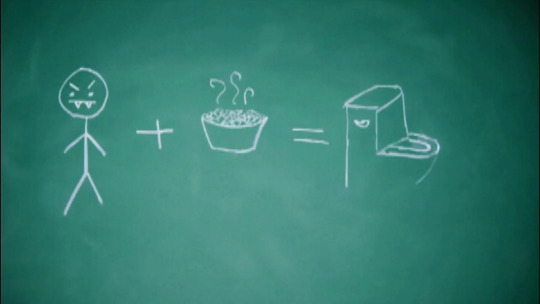
Lucy, the Daughter of the Devil #8: “The Special Fathers vs. the Vampire Altar Boys” | October 22, 2007 - 12:15AM | S01E08
I admire when a TV show does an episode that breaks from it’s formula, generally speaking. But when a TV show you despise does it almost feels embarrassing, like you’re accidentally witnessed something you’re not supposed to see.
I guess it’s somewhat comparable to the time in fifth grade when my mom scheduled a dentist appointment during a school day, which made me a couple hours late to school. By happenstance that day wound up being the day we were doing sex ed. They combined two classes and split the boys from each class into one room and the girls from each class into another. Coincidentally the girls got to stay in what would have been my home room. So when I walked in I was met with about 40 girls all yelling at me to get out. That’s sorta like this, except imagine the girls-only sex ed instructor is Loren Bouchard on a DVD audio commentary pompously explaining how he felt it was important to break the formula of the show for this episode, and the fifth grade girls that are yelling at me to get out are just different fifth grade girls, but wearing all black.
To finish that story: when the boy’s class was over the instructor told us we were welcome to stay after and ask more questions if we wanted. My friends and I actually took her up on that. We were the “obviously have seen porn” kids, and we asked some slightly more advanced questions then what was presented to us in class. I remember this afternoon fondly, but I wonder if we were usurping the time meant for the molested children among us to come get some help. Oh well. Best not to think about it too much. The folly of youth!!!
Speaking of getting molested: This one is a standalone Lucy-less story about the Special Fathers being called to address a growing problem of vampiric choir boys in various churches. It actually starts off with an attempted molestation by a priest on an alter boy getting shut down by said alter boy actually growing fangs and drinking the blood of said priest.
The Special Fathers are brought in and briefed on the matter at hand. We are treated to a little cutesy chalkboard drawing animation describing how to kill a vampire and explaining which myths are from movies and are bogus. One of the fathers points out that most modern movies also include similar lines to “forget what you’ve seen in movies”, which is a decently funny observation. I also liked the little exchange about how one of the Vatican scientists has a captive vampire for purely vain reasons (to best a friend who has a pet snake). Also mildly funny.
Another bit I sorta like is when the tenacious Eugene Mirman nun is being drained of her blood while shackled to the cross. She refuses to die, and keeps spitefully making mundane conversation. She winds up getting rescued by the priests who charge in with a big inflatable mattress on top of a truck. That’s the other thing: the church discovered that crosses have no effect on these vampires, but they are terrified of balloons.
I don’t like this show, but I’d call this one of the stronger episodes. Nothing made me laugh out loud, but there are some ideas I thought were decently amusing. The story moves quickly and then it’s over. That 23 minutes went by fast! Wait? 23 minutes? That can’t be right.
Okay, it isn’t right. BUT: If you watch this on HBOMax right now, the episode appears to be double-length. That’s because they uploaded it without editing the master, which includes a superfluous copy of the episode tacked onto the end with no text. So you can make your fan edit of this episode replacing all the credits with comic sans font.
MAIL BAG
There was a cool goth-ish girl at my high school who used to wear a Home Movies shirt all the time. I wonder if she ever saw or was even aware of Lucy. Anyway, I wonder if loren was jealous of all the goth puss jackson & doc probably pulled in
Loren would kill to smell even Dino’s finger’s (which yielded a 1 in 5 chance there’d be man juice on there)
Reading that last robot chicken review made me go “wow they used to have a girl ninja turtle named Venus” out loud to the friend I was calling which then piqued our curiosity enough for us to look at a bunch of low resolution pictures of her and try to figure out if she had nipples or not. She didn’t but it really looks like she does sometimes. She didn’t though. It was just a trick of the eye. It was just a trick.
They are calling this maybe one of the worst tricks ever pulled, in my mouth
3 notes
·
View notes
Text
Sap S4 Hana Finance Training Finish To End By Pradeep Hota
So you too should adapt to this new methodology and get the most effective of it. Thus, on this context, selecting the Online training mode continues to be a widely accepted possibility for many aspirants as it gives more flexibility and more options to select from. This is a good decision because it actually lets you take a significantly better choice. However, you should know the main elements you must think about to choose the best online institute or coach in your training. Hi Pradeep, https://www.londontraininginstitute.co.uk/sap-certification-courses-uk/sap-mm-training-london have cleared my professional certification today, thanks on your help and documents. You can E-mail your question to the support Email-ID which we might share with you.
SAP is certainly one of the world’s largest ERP software program model, supporting varied industries worldwide.
This additionally contains Management Accounting subjects like Product Costing, Profitability Analysis, New Asset Accounting and other key subjects of SAP S4 HANA Controlling.
We assist in Resume Assistance, mock interviews/Interview preparation and so forth.
SAP offers the following deployment choices to provide real-time option to clients to leverage HANA multi-tenancy functionality for the SAP HANA cloud platform. It is a new product fully constructed on probably the most advanced in-memory platform which delivers large simplifications, modifications and improvements to assist businesses to run simple. The SAP Simple Finance solution marked the first step in our SAP S/4HANA highway map for patrons. The resolution has demonstrated the value of simplification and immediate insight in Finance.
For Businesses
We provide Customised One to One training in each Classroom and Online based mostly trainings. All these trainings are reside interactive periods whereby you can raise considerations and discussions at any level through the class. Course dates and timings are confirmed firstly of your course to make sure you are able to attend. Although there is not any guarantee of a job on track completion we're virtually certain that you should be able to find a suitable place within a quantity of weeks after profitable completion of the course. A good bachelor’s degree in any subject would be an advantage. Awareness to database applied sciences and basic software knowledge is advantageous however not a should.

It has hundreds of thousands of shows already uploaded and obtainable with 1,000s more being uploaded by its customers daily. Whatever your space of curiosity, here you’ll be capable of finding and consider shows you’ll love and probably obtain. And, best of all, it is fully free and straightforward to make use of. When autocomplete outcomes can be found expend and down arrows to evaluation and enter to select.
Sap S/4hana Finance Training (vs Sap Fico) – Configuration & End-user
We conduct lessons on premium coaching software program which presents lots of user-friendly features. The instruments in that software program will help you to get linked with the trainer in essentially the most convenient manner. SAP FICO is the Financial module of SAP that was launched on the ECC model. While SAP S/4HANA Finance is predicated on HANA Database which works on cloud-based expertise. Learn more in regards to the distinction between FICO and S/4HANA Finance.
youtube
In case of ILVT and SPVT, you may have an choice to entry other trainer’s movies on raising request to the co-ordinators and assist group. But the entry to the beforehand shared videos shall be restricted. After the session is full, all of the session videos are uploaded so that you simply can view using the weblog. You can entry the blog from any gadget connected to internet and watch the videos. Shorter Sessions – By offering shorter session period after which offering assignments, provides the trainees time to grasp the ideas and practice from the assignments and be ready for the next session.
We have additionally collaborated with professionals with our bi training courses. Our college students have free access to the SAP Next Gen learning hub, where 19 certification tracks are available. Each certification is cloud-based and could be accessed on-line from anyplace on the planet. Nottingham University Business School has invested in building expertise in several SAP functions to allow us to help the following certifications. Students attending training by way of Online LIVE Training have an actual time, Live Instructor Led scholar experience by way of our Virtual Learning Campus. Online LIVE Training supplies an attractive reside classroom surroundings that allows students to easily interact with instructors and fellow college students in-person just about.
2 notes
·
View notes
Text
Sap S4 Hana Finance Coaching End To Finish By Pradeep Hota
So you too should adapt to this new method and get the most effective of it. Thus, on this context, choosing the Online training mode is still a broadly accepted possibility for lots of aspirants as it provides extra flexibility and more options to choose from. This is a good choice because it actually helps you to take a much better determination. However, you need to know the major components you need to consider to determine on one of the best on-line institute or coach in your training. Hi Pradeep, Today I even have cleared my professional certification today, thanks in your help and documents. You can E-mail your question to the help Email-ID which we would share with you.
SAP is probably considered one of the world’s largest ERP software model, supporting varied industries worldwide.
This additionally consists of Management Accounting topics like Product Costing, Profitability Analysis, New Asset Accounting and different key topics of SAP S4 HANA Controlling.
We assist in Resume Assistance, mock interviews/Interview preparation and so forth.
Instructor Led Live Training – In this mode college students attend the Live on-line periods as per the training schedule.
SAP provides the next deployment choices to offer real-time choice to customers to leverage HANA multi-tenancy performance for the SAP HANA cloud platform. It is a new product utterly constructed on the most advanced in-memory platform which delivers large simplifications, modifications and improvements to assist companies to run easy. The SAP Simple Finance solution marked step one in our SAP S/4HANA street map for customers. The answer has demonstrated the value of simplification and prompt insight in Finance.
For Companies
We provide Customised One to One training in both Classroom and Online based trainings. All these trainings are live interactive classes whereby you'll find a way to increase concerns and discussions at any point through the class. Course dates and timings are confirmed at the start of your course to ensure you'll be able to attend. Although there isn't any guarantee of a job on course completion we are nearly certain that you need to be in a position to find a suitable position inside a number of weeks after successful completion of the course. A good bachelor’s diploma in any area would be an advantage. Awareness to database technologies and fundamental software program information is advantageous however not a should.

It has tens of millions of shows already uploaded and obtainable with 1,000s extra being uploaded by its users every single day. Whatever your area of curiosity, here you’ll be able to find and view presentations you’ll love and possibly obtain. And, better of all, it's utterly free and straightforward to use. When autocomplete outcomes can be found burn up and down arrows to review and enter to pick.
Sap S/4hana Finance Coaching (vs Sap Fico) – Configuration & End-user
We conduct courses on premium training software program which offers a lot of user-friendly features. The instruments in that software program will assist you to get related with the coach in probably the most convenient manner. SAP FICO is the Financial module of SAP that was launched on the ECC model. While SAP S/4HANA Finance relies on HANA Database which works on cloud-based know-how. Learn more about the difference between FICO and S/4HANA Finance.
youtube
In case of ILVT and SPVT, you could have an option to entry other trainer’s movies on raising request to the co-ordinators and support group. But the entry to the beforehand shared movies will be restricted. After the session is full, all the session movies are uploaded for you to view using the blog. You can access the weblog from any device connected to web and watch the videos. Shorter Sessions – By providing shorter session duration after which providing assignments, provides the trainees time to know the ideas and apply from the assignments and be prepared for the following session.
Sap Basis Course
We have also collaborated with professionals with our bi training courses. Our students have free entry to the SAP Next Gen studying hub, the place 19 certification tracks are available. Each certification is cloud-based and may be accessed on-line from anyplace on the planet. sap simple finance online training uk has invested in constructing experience in several SAP functions to allow us to help the following certifications. Students attending coaching through Online LIVE Training have an actual time, Live Instructor Led pupil expertise by way of our Virtual Learning Campus. Online LIVE Training supplies an enticing stay classroom setting that permits students to simply interact with instructors and fellow students in-person virtually.
#sap simple finance training uk#sap simple finance course uk#sap simple finance training london#sap simple finance course london#sap simple finance online training uk#sap simple finance online training#sap simple finance online course
2 notes
·
View notes
Text
“Tell Me What Happened:” Zutara and the Female Gaze
I’ve seen some discourse about the male and female gaze, and I think some people misunderstand what these terms actually mean. So let’s go back a bit to the origins.
The term “the male gaze” was popularized by feminist film critic Laura Mulvey. In her essay, “Visual Pleasure in Narrative Cinema,” Mulvey uses the Hitchcock film Rear Window, which is a story that is entirely framed around the voyeurism of the main male character. There’s a point in the movie where the protagonist’s girlfriend, who had previously doubted the events the protagonist claimed to view out of his apartment window, which make up most of the action of the story, finally comes around to his way of seeing things, and delivers the very effective and famous line “Tell me exactly what you saw, and what you think it means.”
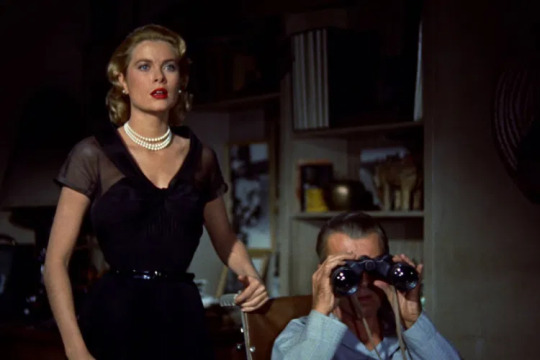
Most of the time when people talk about the male gaze, they refer to female characters being displayed as objects for an assumed male viewer. Mulvey argues that the way the character Lisa is portrayed in this movie does subject her to this voyeuristic interpretation, but it goes deeper than that. When Lisa is not the object being viewed, she is asked to see things through the perspective of the main male character. She originally doubts him, but eventually she is forced to view things from his perspective. Later in the movie, she becomes subject to the protagonist’s gaze as we see her on the other side of the binoculars. Her boyfriend, the character through which the movie establishes its viewpoint, watches her be threatened by another man and eventually she is saved.
The movie both invites the assumed male viewer to view Lisa as an object AND asks her, as the movie’s female protagonist, to view things through the lens of the male protagonist.
And that’s what most of the critiques I see of Katara and Aang’s relationship are about. Take “The Fortune Teller,” for example.
Many people have already talked about how "The Fortuneteller" treats Aang's crush on Katara vs Meng's crush on Aang, but I would like to point out what I think is a particularly egregious example of the male gaze in this episode.
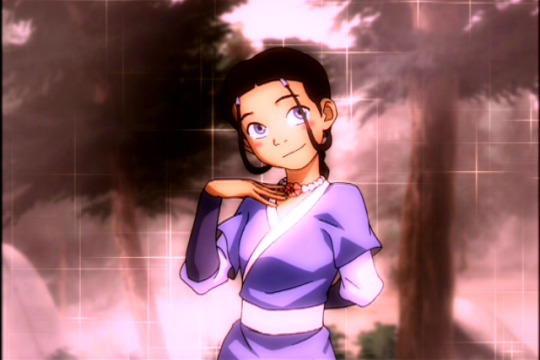
This is Aang looking at Katara. We get the pan over her body with emphasis on how attractive Aang finds her to be. The lighting makes her look practically angelic.
Then, later in the episode, when we see Meng crush on Aang, we get a similar pan.
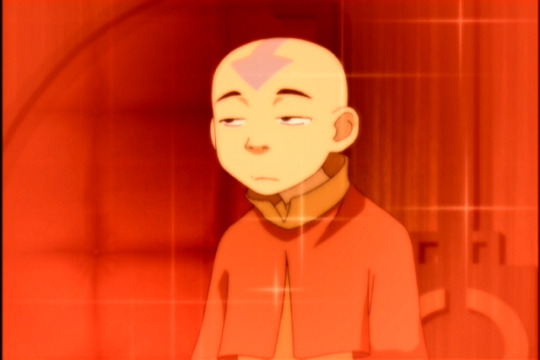
The joke is meant to contrast Katara's desirability with Aang's, yet we are supposed to root for Aang as he worries that Katara does not return his feelings.
The show is also making fun of Aang's crush on Katara by showing Aang's exaggerated perspective, but she still remains desirable in his view and to the camera. There is no undercutting of Aang's view of Katara the way the camera subverts Meng’s view of Aang. We are not asked to see Aang as desirable from a female perspective, which begs the question of what Katara should see in him if female desire is so, well...undesirable.
This is one of several places where the show is self aware enough to poke fun at the way Aang sees Katara, but still in the end totally validates him and the male gaze by only subverting it when the genders are flipped. Which isn't actually a subversion at all.
This is an example of the camera framing a female character as object of the male gaze, but it goes deeper than that. The male gaze isn’t just framing women as objects to be looked at, but inviting women to view themselves through the filter of the male gaze as well.
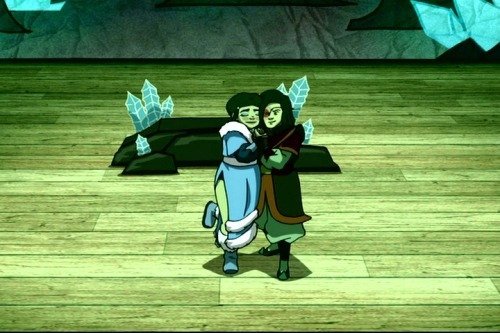
And therein, I would argue, is the appeal of zutara.
You could make a case that one of the reasons zutara is so popular is because the show does occasionally present Zuko as an object for the gaze of a female audience. The creators were aware at a certain point that there was a not insignificant portion of the fandom that was into Zuko.
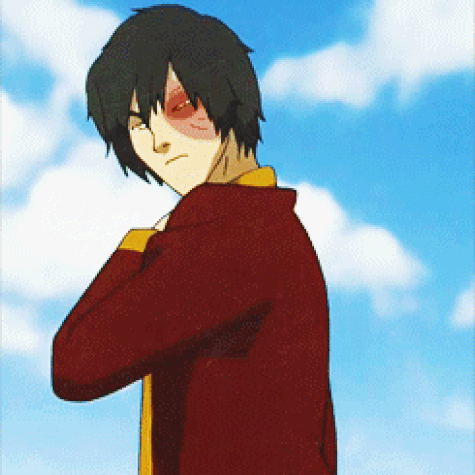
But Zuko is never framed as an object of desirability for Katara.
What the show does do, though, is switch up the lens through which we are supposed to view the narrative. And the way this happens is directly tied to Katara’s relationship with Zuko.
Katara is, in a lot of ways, our narrator from the beginning. Her words are the first ones heard from episode one, telling us about the world and the war and the Avatar. Her narration is focused on Aang and his story. “I believe that Aang can save the world.”
Katara also has her own story, though, one she talks about throughout the series but mostly in relation to others. And it’s this story that she confronts Zuko with in the crystal caves, when she tells him that he has “no idea” what she has suffered, and she tells him about the death of her mother.
Zuko does something she doesn’t expect by apologizing and relating it to the loss of his own mother, but he still can’t fully commit to her side and ends up betraying their tentative truce. It’s when she confronts him with it again in “The Southern Raiders” that things start to shift.
Before that, Katara had used the death of her mother to empathize with other’s loss, and many times this is a male character. We’ve heard the story told many times. Sokka tells it to Toph to explain Katara to her.
When Zuko seeks out Sokka in “The Southern Raiders,” though, it is the first time that another character has asked to hear the story.
Zuko: I want you to tell me what happened to your mother.
Sokka tells Zuko the story and tells Zuko that it’s not something he likes to think about. This relates to how Katara and Sokka differently view what happened to their mother, and partially contributes to why Katara told Sokka that maybe he didn’t love her enough. For Sokka, the day of his mother’s murder is not something he wants to relive, but Katara is constantly forced to relive it.
“The Southern Raiders” contains three full flashbacks to Kya’s murder. First from Sokka’s viewpoint, then Katara herself as she is telling the story to Zuko. The last time we see the story play out, it is as Katara is standing in front of Yon Rha and confronting him with it, while Zuko looks on passively.
Here, the dynamic has shifted so that Katara is not only the one telling the story, but in the end she is also the one who gets to rewrite it, to define how it ends, and Zuko is the observer, much like Lisa in “Rear Window.” Tell me what you saw and what you think it means.
Zuko knows the importance of letting Katara give shape and meaning to this story because he himself tried to do the same with Ozai, who is the only one left to speak about what happened to Ursa.
Ozai: Don’t you want to know what happened to your mother?
That both of these narratives involve women being silenced emphasizes the reclamation of them as the shifting from a male gaze to a female one. That Zuko’s redemption is tied to such a shift is very interesting, especially given the elemental symbolism of fire = male and water = female. That “The Southern Raiders,” one of the most shippy episodes, involves Katara ignoring Aang’s attempts to define the situation and, in the episode’s climax, forcing two male characters to observe as she describes what happened to her mother, a woman she is so connected with, is significant. Katara directs both the gazes of Zuko and Yon Rha, and by extension the audience, just as she effortlessly directs the rain itself. The last time we see the memory retold it is Katara revealing the truth to Yon Rha, who thought he had killed the last waterbender. The fact that this episode was penned by a woman also emphasizes the power of reclaiming narratives with a female gaze.
223 notes
·
View notes
Text
Kizuna itself vs. the two versions of the novel
Written on request from a friend who wanted to remain anonymous. This is more of an editorial than a meta, and while I usually have a policy of “this is an analysis blog, not a review blog” it goes into more of my personal impressions and opinions than usual, but it’s something I write hoping to be helpful.
There are basically three “official” full versions of Kizuna: one being, of course, the movie itself, one being the Dash X Bunko version of the novel, and one being the Shueisha Mirai Bunko version of it. While it’s certainly not to say that any of the three is an “incomplete” version of the narrative, if you really want as full of a picture of the story as possible, somehow, each of all three versions of the story happens to have really important information that the other two do not. If I had to pick only one of these three versions to recommend to people, I would of course pick the movie itself; it’s obviously the base story everything else is based off of and was the one the production centered around as a priority, but the novelizations have a surprising amount of info that provide a lot of insight into the movie’s story and themes.
I get the impression that the creation of Kizuna involved making a lot more story and background details than could fit in a 95-minute movie, so these novelizations, which were based directly off the original movie script, ended up being an outlet for a lot of these details (and as much as I could be harsh on the movie itself for being a bit “reliant” on extra material, I have to admit that Adventure and 02 were both like this too -- a lot of our current understanding of the series comes from the Adventure novels and drama CDs -- so frankly I’m thankful we at least got this with a 95-minute movie instead of a yearlong series). On the flip side, while I'm not going to say that the novels are completely and utterly inaccurate representations of the movie, in a perhaps too-close approximation of Adventure and 02's writing style, this is a movie where even the nuances in a single line or split-second moment carry heavy implications, which become much blurrier or harder to identify when they’re presented differently (or not even presented at all) in the novel’s context, especially when they emphasize very different things from what the movie itself was emphasizing.
The short version of this is that I believe the Dash X version contains the greater amount of “plot and story” information but significantly misses out on the emotional themes and presentation, whereas the Shueisha Mirai version abridges and cuts chunks of content but is much better at conveying the intended message. More on this below the cut. (Note that the following post spoils Kizuna’s plot events.)
The movie itself
Since the following parts are more “in comparison to the movie”, I’m not going to go too much into this in this section, but one thing I will say is that the official English subtitle translation for the movie is really not great. Even if you take out nitpickiness about the fact it misses several significant nuances (the difference between “unchangeable fate” and “changeable destiny”, or the fact that Gennai refers to partnership dissolution as a “case” and not like it’s something that happens overall) at really plot-important moments, some lines (thankfully, usually not plot-important ones) are just straight-up incorrect. And worse, there’s evidence the official English dub was based on that translation! (I’m not faulting the people in charge of the dub for this, but whoever handed them that translation to work with.)
The dialogue in the Dash X Bunko version is transcribed effectively word-for-word from the dialogue in the movie (or perhaps vice versa, given that the novel is based on the original script), so I highly recommend checking that version as a reference for dialogue or if you want to do any intimate analysis on it. I don't want to go as far as to suggest not supporting the official version of the movie because of this, but at least please be aware that the translation used there is not entirely reliable.
Dash X Bunko
If you talk about “the Kizuna novel”, this is the one that people usually tend to be referring to, for two reasons. Firstly, it was translated shortly after the movie’s release, and due to the unfortunate circumstances of Kizuna being delayed in accessibility outside Japan for several months, this basically served as the only comprehensive source of info about the movie outside Japan for a very long time. Secondly, in Japan, this one was marketed as “the one for adults” in contrast to the Shueisha Mirai one being “for kids”, which meant that a lot of people assumed that the latter one was just an incredibly stripped down version that was otherwise disposable or replaceable. (This is very, very much not the case, and is extremely ironic when it comes to a movie that partially centers around the dangers of looking down too much on things associated with childhood.)
When it comes to “plot and story info”, this is the one that probably serves as the best reference (especially for fanfic writers or those who need a refresher on certain plot events or to look up something quickly), and probably has the most “comprehensive” listing of plot events surrounding the movie. The dialogue in it is a word-for-word recreation of the movie’s script, and actually includes more scenes than the movie itself does, including two that I suspect to be deleted scenes (a detailing of the specifics behind the initial plan to pursue Eosmon, and a conversation between Koushirou and Tentomon) and adaptations of the first and second memorial shorts within their context in the movie. It also contains some interesting background details and extra context for some things in the movie that you might think would normally be animation flair or something, but take a very interesting implication of story importance if they’re going out of their way to write this in the script. (There’s a scene where Agumon and Gabumon appear in front of their partners when they’d been behind them a minute before, and it’s easy to think this might be an animation error, but not only does the surrounding context make this unlikely, the novel itself actually directly states that their positions had changed.) Given that, I think it was very fortunate that this novel was available to us for those outside Japan waiting for the actual movie to come out, because this level of detail was very important to have on hand rather than fragmented spoilers on social media.
However, the part where I think the novel is significantly deficient in compared to the actual movie (and also to the other version of the novel) is that it describes the plot events in too blunt of a manner and doesn’t bring out its themes very well. (It’s kind of like having a long and very detailed Wikipedia article plot summary; it definitely got all the hard facts down, but the emotion is gone, which is still a pretty significant issue when media’s all about the feelings and message in the end.) While “considering the movie to be more cynical than it’s probably meant to be” happens regardless of which version someone’s working from, I’ve talked to perhaps an unnervingly high number of people who started with the novel and were absolutely convinced that the movie’s message was about adulthood sucking and needing to just accept it, until they saw how the actual movie pulled it off and the surrounding atmosphere and realized it definitely was not. (I think one really big factor here is that a lot of the visual imagery makes it extremely, extremely hard to miss that Menoa’s mentality is completely screwed up and her way of seeing things was dubious to begin with; prose descriptions really just don’t capture the way they slam this in your face with visual and musical cues during the climax of the movie.)
You can figure this out from the novel itself, but you have to really be looking closely at the way they word things, and on top of that it’s hard to figure out which parts you should be focusing on and which parts aren’t actually that important -- in other words, the “choice of priorities” gets a bit lost in there. Even the little things lose a lot of value; it’s theoretically possible to use the novel to put together that Daisuke is wearing his sunglasses indoors during his first scene, but you have to put together the context clues from completely different paragraphs to figure this out, none of which compares to the actual hilarity of visually seeing him wearing the thing in a very obviously dimly lit restaurant because he’s our beloved idiot. (For more details, please see my post with more elaboration on this and more examples of this kind of thing.)
I wouldn’t say that the movie itself isn’t guilty of (perhaps accidentally) having some degree of mixed messaging, but I would say this problem is rather exacerbated by the novel’s way of presenting it due to its dedication to dropping every single plot detail and event without much in the way of choosing what to contextualize and what to put emphasis on (as it turns out, treating practically everything in the movie as if it has equal weight might not be a great idea). So, again, for that reason I think the novel serves as a good reference in terms of remembering what happened in it and knowing the movie’s contents, but I also feel that it’s really not the greatest deliverer of the movie’s message or themes at all.
Shueisha Mirai Bunko
The second version of the novel was not translated until several months after the movie first released, and shortly before the Blu-ray and streaming versions of the movie itself came out anyway, so my impression is that on this end a lot of people don’t even know it was a thing. On top of that, even those who know about it often dismiss it as the “kid version” -- and to be fair, it did baffle quite a few people as to why this version even exists (Kizuna is technically not unacceptable for kid viewing and its plot is still understandable regardless of age, but since the movie is so heavily about the millennial existential crisis, it’s not something kids would really relate to). So a lot of people tended to just skip over it...which is really a shame, because it contains some interesting things that actually aren’t in the other two versions at all. For instance, did you know that, as of this writing, this is the only thing that plainly states the specific explanation for why Yamato decided to become an astronaut, for the first time in 20 real-life years?
While there are still some things that weren’t in the movie proper (mainly the Eosmon initial plan and the adaptation of the second memorial short), for the most part, the actual events are somewhat abridged compared to the movie and the Dash X version, and other than a few stray lines, there’s not a lot of extra information that would be as helpful for referencing the events of the plot. The version of the novel here is rather broadly interpretive of the scenes in the movie, so several things are condensed or taken out (and, amusingly, because it’s assuming that the kids reading this don’t actually know the original Adventure or 02, it has to describe what each character is like in a quick one-liner).
However, interestingly enough, it’s because it’s so heavily interpretive that it illuminates a lot of things that weren’t really easy to glean out of the Dash X version. For instance:
Some scenes are described with “other perspectives” that give you info on someone else’s point of view. (For instance, we see more of Yamato’s perspective and thoughts when he has his first phone call with Daisuke, or a bit more detail in the process of how Eosmon kidnappings work.)
We get a lot more information on what’s going through everyone’s heads during each scene, and what emotions they’re feeling at a given time. (This is something that you could at least get to some degree in the movie itself from facial expressions and framing, but would often be a lot blurrier in the Dash X version; here, it’s spelled out in words.)
When things are abridged, you get a clearer idea of what the intended point and theme of the scene was because it’s stripped down to include only that part. In one really interesting case, the scene with Agumon finding Taichi’s AVs has a “censored” equivalent where Taichi’s pushed to a corner because he can’t find anything non-alcoholic in his fridge -- so when you look at the two versions of the scene and what they have in common, you can figure out that the point isn’t that it was a lewd joke for the sake of it, but rather that Taichi’s forcing himself into boxes of “adulthood” that are actually meaningless and impractical.
Some of the descriptions of the characters, scenes, and background information make it a lot more obvious as to their purpose in the narrative (it outright confirms that Miyako being in Spain means that her personality is getting overly enabled there).
The scene where the circumstances behind Morphomon’s disappearance are revealed makes it significantly less subtle what the point is. In the actual movie, a lot of this involved visual framing with Menoa seeming to become more and more distant, but in this version of the novel they basically whack you over the head with the final confirmation that Menoa is guilty of neglecting her own partner, which contradicts her own assertions that “they were always together” (maybe not emotionally, it seems!) and helps clarify the commonality between her, Taichi, Yamato, and Sora in what exactly led to their partners disappearing.
Bonus: this version of the novel really wants you to know that the ending of the movie is about Taichi and Yamato fully having the determination to turn things around and lead up to the 02 epilogue. (The movie’s version of this involves the extended version of Taichi’s thesis and the credits photo with Yamato obviously next to a rocket, while this novel’s version involves more detailed fleshing out of how Taichi and Yamato decided to use their experiences to move onto their eventual career paths and what kind of hope they still have at the end. The Dash X version...didn’t really have a very strong equivalent here.)
In other words, while this version of the novel isn’t the greatest reference for plot or worldbuilding, it does a much more effective job being straightforward about the intended themes and message of the movie, and even if the scenes in it are much more loosely adapted, it’s much better at adapting the emotional nuances of the things that would normally be conveyed via visuals, expressions, and voice acting. (Although I would still say that the movie itself is the best reference for that kind of thing, of course.) If you just want lore or plot ideas, I don’t think it’ll help you very much, but since this series is so much about characters that had their ways of thinking fleshed out in such incredible detail, and about strong theme messaging, this is all still very valuable information in its own way.
56 notes
·
View notes
Text
i have opinions about The Prince of Egypt musical adaption and you’re going to listen to them: An Essay
So, quick disclaimer: The Prince of Egypt is one of my favourite movies of all time. The casting, the music, the animation, I think it’s one of the top-tier movies that have ever been made. I went into seeing the London West End production of PoE with a full expectation that nothing I saw on stage would ever live up to how much I love the movie. I was fully aware there are plenty of limitations to what can be shown live on a stage with human actors and props.
That being said, I was enormously disappointed with how the whole thing was handled.
The Good
Now before I launch into a whole tirade of what I didn’t like about the production, it does behoove me to say what I think they did do well.
The casting of the role of Moses was done fantastically, as was Miriam, Tzipporah, and Yocheved. The swings and the ensemble were really engaged and well placed, going through lots of quick changes to go from Hebrews to Egyptians to Midianites and back.
The two Egyptian queens, wifes of Seti and Ramses, are actually given names, lines, and character beyond being simply tacked onto their respective kings. We get to see how they feel about the events happening around them, and there’s even a scene where Ramses meets his wife and courts her, whereas in the movie, she stands in the background and says nothing. This is one of the areas I was hoping the musical, which would naturally have a longer run-time, would expand on, and I was pleased to see the opportunity was taken.
Light projections on enormous curtains were used to very good effect, taking us instantly inside the walls of the palace and then out to the desert.
Over all, the work was really put in to be engaging and emotional, and the orchestra really worked to deliver the right musical beats.
One of two stand out scenes as being done very well was the opening “Deliver Us”, which included a bone-chilling moment of Egyptians separating a mother and her baby, with her screams as she’s dragged off-stage, and the blood on the guard’s sword. It really brings home the fear as Yocheved tries to lead Aaron and Miriam to the river with her, not to mention Yocheved’s actress nailed the lullaby.
The second was at the other end of the show, “When You Believe” was beautifully performed by the whole cast, though it was somewhat stunted by what came before...
The Bad
Oh boy.
So the main problem with this show is not the music, not the staging, not even that sometimes the ensemble was a little off-beat (the lai-lai-lai section in Though Heaven’s Eyes comes to mind). Any mistakes there can all be forgiven, since sometimes things just happen in live performance, someone’s a bit off or something’s just not possible to do on the budget allotted.
The problem is in the script.
The Prince of Egypt movie is a story that stands not only on the shoulders of its fantastic music and visuals, but also on its emotive retelling and portrayal of the characters within - mainly Moses and Ramses. And while the stage musical does spend a lot of time with the two mains, it neglects two other, incredibly important characters.
Pharaoh Seti, and God.
In the movie, Seti strikes an intimidating figure. He is old, hardened, and wise in the ways of ruling his kingdom - and is voiced by Patrick Stewart, who brings his A-game to the role. Both Moses and Ramses admire him and look up to him immensely as young men, and the relationship he has with both of them deeply informs their characters as the story progresses. It’s from Seti that Moses learns that taking responsibility for your actions is the respectable thing to do (and later, the true horror of having your idol turn out to be not what you think), and it’s from Seti that Ramses takes a huge inferiority complex.
There are two lines that Seti gets in the movie, one spoken to Moses, and one to Ramses. These two lines define Moses and Ramses’ actions later on in the story:
To Ramses - “One weak link can break the chain of a mighty dynasty!”
To Moses - “Oh my son... they were only slaves.”
Guess which two lines are absent from the musical?
One Weak Link is turned into an upbeat song, rather than shouted at a terrified and cowed young Ramses. Instead of being openly a traumatic, internalised moment of negative character development for Ramses, it’s treated as a general philosophy that Seti passes down to his son. Instead of a judgement that is hung over Ramses’ head like a sword of Damocles, lingering in his mind through the whole story and coming up in a shouted argument with Moses later, it’s said and then moved on from.
The “they were only slaves” comment, on the other hand, is absent entirely. This changes Moses’ relationship with Seti enormously, as well as his relationship with the Hebrew people. Upon finding the mural depicting the killing of the slave children, Moses is appropriately horrified, and Seti shows up to comfort him and defend his terrible actions. Moses leaves this interaction... and then sings about how this is indeed all he ever wanted! He has no moment of horrific realisation that his father thinks of the slaves as lesser, as lives that can be thrown away. This means that the scene where he kills the guard doesn’t lead into a discussion of morality with Ramses as he runs away, but rather Moses breaking down about his heritage as though it’s a negative, instead of something he’s realised is just as valuable as his life as an Egyptian. Instead of Moses being shown as having a strong moral core that protests against the idea of any life being lesser, he bemoans his Hebrew blood loudly, and makes little mention of the man he killed. His issue that causes him to run away is being adopted, rather than his guilt that he’s a murderer, and nothing Ramses can say will change it.
Later on, we don’t see Ramses express this opinion either (in the movie - M:”Seti’s hands bore the blood of thousands of children!” R:“Hah, slaves!” M:“My people!”) so it seems the core reasoning for the necessity of the extremes God had to go to in order to convince Ramses to let the Hebrews go is completely gone.
Which leads us into God Himself, as a character.
God is a tricky topic in general. He is hard to talk about as a concept and as a character, and even harder to depict in a way that won’t offend someone. The Prince of Egypt movie always struck me as a very good depiction of the Old Testament God - vengeful and strong-willed, commanding and yet nurturing, capable of great mercy and great cruelty in one fell swoop. God is incredibly present in the story, a character in and of Himself, speaking with Moses rather than simply commanding him. The conversation at the Burning Bush is bone-chillingly beautiful. Moses is allowed to question, he’s allowed to enquire, he’s allowed to express how he feels about God’s choice, and God is given the chance to respond (and reprimand, and comfort).
In the musical, the Burning Bush scene lasts all of two minutes, during which God (the ensemble cast, acting as one moving flame, speaking in unison) monologues to Moses, and Moses is not given room to question, talk to, or build a relationship with God. Later on, once some of the plagues have gotten underway, Moses rails against God, flinches in his resolve, and tries to back out... and God says nothing. It’s Miriam and the spirit of Yocheved that convince Moses to keep going. As a character, God is nearly absent. Even when it comes to calling upon the Plagues, or parting the Red Sea, God’s voice is absent. Moses does not pray. He does not even use the staff that God encouraged him to pick up as a symbol of his becoming a shepherd of the Hebrews out of Egypt.
It’s these little changes, these little absences of such vital lines and presences, that ends up changing the whole vibe of the show. Seti is more like a dad than an emotionally distant authority figure, and God is more like an emotionally distant authority figure than a character at all. Ultimately, the whole feeling that one is left with at the end…
The Ugly
… is that the script doesn’t like God, or religion in general.
A bold statement to make, considering the source material is one of the central biblical stories in EVERY Abrahamic religion. Moses as a figure is considered so important and close to god, that The Prince of Egypt, even with its sensitive portrayal, cannot be aired in a number of Islamic states, because it’s considered disrespectful to depict any of the prophets, especially an important one like Moses. Moses is arguably the MOST important prophet in the Jewish canon.
However, I haven’t highlighted one of the most noticeable script changes - the elevation of Hotep, the high priest, to main antagonist.
In the original movie, Hotep is a secondary villain, a crony to the Pharaohs, bumbling and snide and two-faced. He and his fellow priest Hoy are there primarily to juxtapose how charlatans can control power through flattery and slight of hand, reassuring Ramses that Moses’ miracles are merely magic the same as what they can do. They even get a whole villain song, “Playing With The Big Boys” which is a lovely deconstruction of lyrics vs visuals, where while the priests boast that their gods and magic are much more powerful, in the background the staff, transformed into a snake by god, devours and defeats the priests’ snake handily. The takeaway from the song is that God’s power is true, and doesn’t need theatrics.
It’s a good little nugget of wordless world building. And it is completely absent from the stage musical, with only a vague reference to the chant of all the gods names.
Hoy is gone, and Hotep is the only priest. He actively speaks out against the Pharaoh, boasts about having all the power, and is played as bombastic and proud. He’s a wildly different character, even threatening Ramses at one point. In the end, it’s shown that Ramses won’t let the Hebrews go not because he has inherited his father Seti’s cruel attitude towards the lives he considers beneath him, but because he is being actively bullied by the priest, and will lose his power and credibility if he doesn’t do as he’s told. Ramses is even given a whole song about how little power he really has. The script desperately wants us to feel sorry for Ramses’ position and hate the unrepentantly, cartoonishly evil priest.
That’s another matter as well - a LOT of time is dedicated to making the Egyptians more human and sympathetic, portraying them as largely ignorant of the suffering beneath them, rather than actively participating in slavery. Characters speak out of turn without regard for formality and class, even to the royal family. They are casual, chummy even. And this would be fine - in fact, it’s good to have that sort of third dimension to characters, even ones who are doing reprehensible things, to show the total normalcy and banality of evil - if it were not for the fact they still include a completely open-and-shut case of evil right next to them.
Hotep has no redeeming features. And on the other side, God is barely present, certainly not in a relatable context. Moses has several lines about how cruel and unnecessary God’s plagues are - and you know what, in this version, they are unnecessary! Ramses is not the stone-hearted ruler that his movie counterpart is, he has no baggage over being a potential failure, because it was never really given to him in the same way! By taking away Ramses’ threatening nature, numbers like the Plagues lose half their appeal, as the back-and-forth ‘you who I called brother’ lines between Moses and Ramses are completely absent. Moses is faithless, and is less torn between the horror of what he’s doing and the necessity of it for the freedom of his people, and more left scrabbling for meaning that he doesn’t find. And the only thing hanging over Ramses is Hotep nit-picking everything he does and threatening him, which is considerably less compelling than the script seems to think it is.
This is best exemplified at the end, when all the issues come to a head. The angel of Death comes and takes the Egyptian first borns (which was actually a well done scene), and the Hebrews leave to a rousing rendition of When You Believe. But then we cut to Ramses and Hotep, with Hotep openly threatening to revolt against the Pharaoh - whom was believed, especially by the priesthood, to be a living god! Hotep is so devoid of redeeming features he cannot even be trusted to stand by his beliefs! - unless Ramses agrees to chase after the Hebrews. Reluctantly, Ramses is badgered into the attempt.
Back with the Hebrews, Moses parts the Red Sea… not with his faith, not by praying to God for another miracle, not even by using his staff as in the most famous scene of the movie… but by holding out his hand and demanding the ‘magic’ work. Setting aside the disrespect of Abrahamic religions to call one of the most famous miracles “magic” (and my oh my, if there was a fundamentalist of any religion in the audience they might have gasped to hear it), it again belittles the work of God, and puts all the onus on Moses, not as a conduit for God’s work, but as the worker himself. Then, the Egyptians arrive in pursuit, lead by Hotep, not Ramses. Moses sends the Hebrews through first, lead by Miriam, and stays behind with Tzipporah… to offer his life in penance to Ramses! The script has completely stripped both Ramses and Moses of their convictions towards their causes, and Moses cannot even stand by his decision to lead his people.
Then, in a moment of jarring melodrama, Moses has a sudden vision that Ramses, his brother, will one day be called Ramses the Great (an actual historical Pharaoh who reigned 1279-1213 BCE). There is no historical evidence that this was the Ramses that ruled over the Hebrews (there are 11 Pharaohs called Ramses through the history of Ancient Egypt), and maybe if the scene was acted a little better, it wouldn’t have been so sudden or jarring. Even more jarring, is that then Hotep arrives with the rest of the army, and Ramses refuses to lead the charge into the parted sea. Hotep does so himself, and is the one to have the final dramatic moment, being crushed under the water.
The Takeaway
After watching the show, I’m afraid I could never recommend it as either a play, an adaption, or even as a faithful retelling of a bible story. Its character drama isn’t compelling enough to be good as a standalone play, with it two main characters declawed and their core motivations reduced to a squabble between brothers rather than a grand interplay between two cultures and ideas and trauma handed down from their father. As an adaption of the movie it’s upsettingly bad, with grand numbers like the Plagues rendered piecemeal and fan favourites like Playing With The Big Boys missing entirely. As a retelling of the bible story, it’s insulting, completely cutting God out of the equation, taking no opportunity to reintroduce Aaron as an important character (which he was, in the bible, as Moses was a notoriously bad public speaker, with a stutter, and Aaron often interpreted for him) and more importantly, completely erasing God’s influence from the narrative.
I don’t know who this show was… for, in that case. If it wasn’t for drama lovers, movie fans, or people of the faith, then who the hell was it for? Why change such a critically acclaimed and well-beloved story? Why take away all these defining moments? If you wanted to tell a story about how religion is the true evil, how God can command people to do terrible things, and how those who uphold organised religion like Hotep are unrepentant, one-dimensional monsters… why would you tell that through the Prince of Egypt?
Underwhelming at best, infuriating at worst… just watch the movie. Or read Exodus. At least the Bible’s free.
67 notes
·
View notes
Text
Why Cap Being Internally Closeted Is Not Only Possible, But Valid Representation
i wrote this to a lot of mitski and onsind, so you can’t blame me for any feelings that bleed through
now i don’t know if it actually exists, but i’ve heard of there being a lot of discourse surrounding the captains story arc regarding his sexuality- i believe the general gist is that having a queer character that remains closeted to themselves is either unrealistic or ‘bad’ representation, and as someone who really treasures the captain and relates to his story so far a lot, i thought i might break this down a bit.
i’ve divded up every complaint i’ve heard about this into four main questions which i’ll be covering below the ‘keep reading’, because this is gonna be pretty comprehensive. full disclaimer i reference my experiences as an ex-evangelical non binary butch lesbian a couple times, and i spent a year studying repression and the psychological impacts of high demand sexual ethics for my graduating sociology paper, so this is coming with some background to it i swear
the big questions:
can you EVEN be gay and not know it????
but isn't this just ANOTHER coming out arc, and aren't we supposed to be moving beyond those?
but if cap can't have a relationship with a man because he's a ghost, what's the point?
since cap's dead, isn't this technically bury your gays, and isn't that bad?
1. "but is it really possible to not know? Isn't that bad representation?"
short answer: no and no.
before i get into the validity of the captain's ignorance about his own orientation as 21st century rep, let's break down how the hell the captain can be so clearly attracted to men and still not even consider the possibility that he might be gay, as brought to you by someone who literally experienced this shit.
the captain's particular situation is both a direct result of the lack of information around human sexuality he would have had (aka clear messaging that it's actually possible for him to be attracted to men. i don't mean acceptable or allowed, i mean physically capable of happening- the idea that orientations other than heterosexual exist and are available to him, a man), and a subconscious survival mechanism. the environment in which he lives is outright hostile to gay people, while the military man identity he has constructed for himself doesn't allow for any form of deviation from societal norms, let alone one so base level and major. as a result of this killer combo of information and environment, instincts take over and the mind does it's best to repress the ‘deviant’ feelings until a. one of these two things changes, or b. the act of repression becomes so destructive and/or exhuasting that it becomes impossible to maintain. the key to maintaining a long-term state of repression of desire is diverting that energy elsewhere, and a high-demand group such as the military is the perfect place for the captain to do this (this technqiue is frequented by religions and extremist ideologies worldwide, but that’s not really what we’re here to focus on).
while the brain is actively repressing ‘deviant’ feelings (aka gay shit), this doesn't mean you don't experience the feelings at all. when performed as a subconscious act of survival, the aim of repression is to minimise/transform the feelings into a state where they can no longer cause immediate danger, and something as big as sexual/romantic orientation is going to keep popping up, but as long as the individual in question never understands what they’re feeling, they’ll be able to continue relatively undisturbed. you know how in heist movies, the leader of the group will only tell each team member part of the plan so they can’t screw things up for everyone else if they get caught? it’s kind of like that.
this is how the captain appears to have operated in life AND in death, and it’s a relatively common experience for lgbtq people who’ve grown up in similar circumstances (aka with a lack of information and in an unfriendly-to-hostile environment), and accounts for how some people can even go on to get married and have children before realising that they’re gay and/or trans.
personally, while i can now identify what were strong homo crushes all the way back to childhood, at the time i genuinely had no idea. there was the underlying sense that i probably shouldn't tell people how attached i was to these girls because i would seem weird, and that my feelings were stronger than the ones other people used to describe friendships, but like-like them in the way that other girls like-liked boys? no way! actually scratch that, it wasn't even a no way, because i had no idea that i even could. i even had my own havers, at least in terms of the emotional hold and devotion she got from me, except she treated me way less well than cap’s beau. snatches of the existence of lgbt people made it through the cone of silence, i definitely heard the words gay and lesbian, but my levels of informations mirrored those that the captain would have had: virtually none, beyond the idea that these words exist, some people are them, and that's not something that we support or think is okay, so let's just not speak about it. despite only attending religious schools for the first couple years of primary, until i got my own technology and social media accounts to explore lgbtq content on my own- option a out of the two catalysts for change- the possibility of me being gay was not at all on my radar. don’t even get me started on how long it took me to explore butchness and my overall gender, two things which now feel glaringly obvious.
when shit starts to break down, you can also make the conscious choice to repress which can delay the eventual smashing down of the mental closet door for a time (essentially when the closet door starts to open, you just say ‘no thanks’ and shut it again by pointedly Not Thinking About It). in the abscence of identifying yourself by your attractions, it becomes quite common to identify with a lack- in my case, this meant becoming proud of how sensible and not boy crazy i was, and in the captain’s case, this means becoming proud of how sensible and not sensuous/wild (aka woman crazy) he was, identifying with his LACK of desire for women and partying (which, even in the 40s, involved the expectation of opposite sex romances and hook ups). i’m not saying that’s the only reason he’s a rule follower, but i think the contrast between About Last Night and Perfect Day pretty much support this. (the captain getting on his high horse about general party antics that he inherently felt excluded from because of underlying awareness of his difference & his tendency to project his regimented expectations of himself onto others, vs. joining in the reception party, awareness of how the environment supports difference in the form of clare and sam, and relaxing his own rules by dancing with men- the captain doesn’t mind a party when feels like he has a place there.)
so the captain was operating in a high demand, highly regulated environment (primarily the military, but also early 20th century England itself), with regimented roles, rules, and expectations. working on the assumption that he wouldn't have had out/disclosing lgbt friends, he would have had little to no exposure to lgbt identities, and what information he did receive would have been hushed and negatively geared. while my world started to open up when i started high school was allowed to have my own phone + instagram account, resulting in me realising something wasn't quite 'right' within a few years (making me a relatively early realiser compared to those who don't come out to themselves until adulthood), in life the captain never had that experience. he didn't receive the information he needed, his environment didn't grow less hostile. with the near-exception of havers related heartbreak, his well disciplined and lifelong method of repression never became destructive/exhaustive enough to permanently override the danger signals in his mind and allow him to put his feelings into words. neither of the most common catalysts for change happened for him, so he continued as usual, even after his death.
BUT, and here’s where we come to why this is actually great representation, arrival of mike and Alison represents the opening up of new world. for the first time, the captain is actively made aware of the fact that his environment is no longer hostile, and better than that, it’s affirming. he’s also getting access to positively geared information about lgbtq people and identities, so option a of the two catalysts for change is absolutely present, and resoundingly positive.
the captain’s arc is also relatively unique as it acknowledges the oppressive nature of his environment, but actually focuses on the internal consequences, and the way that systems like those that the captain lived in succeed because they turn us into our own oppressors. for whatever reason, we repress ourseslves, and often can’t help it, and i find that the significance of the journey to overcome that is often overlooked in more mainstream queer media. perhaps it’s just not very cinematic, or it remains too confronting for cishet audiences, but ghosts manages to touch on it with a lovely amount of humour and hope. Jamie Babbit’s But I’m A Cheerleader is another favourite piece of queer media for the same reasons.
not only does it show this, but as the captain continues to get gayer and lean into some of his less conventional traits (like an interest in fashion and the wedding planning), it shows lgbt people who have been or are going through this that there CAN be a positive outcome. it takes a lot to unlearn all the things that have painted you as wrong, especially when a massive institution is desperate to continue doing so, but you can do it, you can be happy, and it's never too late. (i've been meaning to say that last point for ages for ages, but a mutual beat me to it here)
2. not just another coming out arc
i absolutely support the demand for queer stories that don’t center around coming out (it’s like shrodinger’s queer: if you’re not coming out on screen, do you really even exist?), but i don’t align with the criticisms that the captain should already be out. for the reasons mentioned above, the captain’s particular story is fairly different to the ‘young white teenager who mostly knows gay is fine, it’s just everyone else that’s got the problem, but have a unremarkably straight sounding soundtrack, a trauma porn romance, and a cishet saviour’ that we keep seeing. the captain’s ongoing journey with his sexuality emphasises the overaching theme of the show: recovering from trauma and humanity’s endless capacity for growth, and i think that’s worth showing over and over again until it stops being true.
additionally, while the captain’s journey regarding his gayness is a big part of his character and story, ghosts makes it clear that it’s not the ONLY part, and being gay is far from his ONLY characteristic or dramatic/comedic engine. the fact that i’m even having to congratulate ghosts for doing that really shows how much film and television is struggling huh.
while all queer media is, and should be, subject to criticism, i think if it helps even one person then it absolutely deserves to exist, and i can say i’ve found the captain’s journey to be the lgbt story i’ve found that’s closest to my own, which says a lot considering he’s a dead world war 2 soldier who hangs out with other ghosts including a slutty Tory, a georgian noblewoman, and a literal caveman.
3. if captain gay, why he no have boyfriend????
another complaint that’s been circulating is that since the captain doesn’t, and likely won’t, have a boyfriend, that makes him Bad Representation because it follows the sad single gay trope. i kind of get the logic from this one, and a lot of it is up to personal interpretation, but part of me really enjoys the fact that the captain’s journey towards accepting himself is separated from having a relationship.
coming out is often paired with having romantic/sexual relationships (either as the reason or reward for doing so). my own struggle with repression didn't end the second that came out, and i still struggle with letting myself develop & acknowledge romantic feelings as a result of actively shutting them (and most other feelings in general) down for years, and statistics show that lgbtq youth in particular tend not to live out their 'teen years' until their twenties. by not giving cap a relationship straight away, ghosts separates the act of claiming identity and sexual orientation from finding a partner (two things which are, more often than not, separate), and also provides some very nice validation to folks who have yet to have the relationship they want, especially when lots of mainstream queer media is now jumping on the cishet media bandwagon of acting as if every person loses their virginity and has a life defining relationship at sixteen. it’s essentially a continuation of the earlier theme of “it’s never too late”, and who’s to say the captain won’t get a gay bear ghost boyfriend to go haunt nazis with??? people die all the time, it could happen.
(also, i think him and julian will have definitely shagged at least once. it was a low moment for both of them and they refuse to speak of it.)
lots of asexual/ace spectrum fans have come out to say how much they’ve loved being able to headcanon cap as ace, and while that’s not a headcanon i personally have, i think it’s brilliant that ace fans feel seen by his character- we’re all in this soup together babey (and sorry for cursing everyone still reading this with that cap/julian headcanon. i’m just a vessel)
4. “okay, but cap’s a GHOST- doesn’t that make this Bury Your Gays?”
this is a bit of a complex one, but i’m going to say no as a result of the following break down.
Bury Your Gays (BYG), aka the trope where lgbtq characters are consistently killed off (and often with a heavy dose of trauma, while cishet characters survive) is probably one of my least favourite lgbt media tropes. BYG has two main points:
1. the lgbt character is killed, thus removing them from story entirely- hence the use of the phrase ‘killed OFF’ (killed off of the show/film)
2. the character’s death reinforces the perception that lgbtq people’s lives must end in tragedy, instead of being long and fulfilling, or are inherently less valuable. bonus points if the character is killed in a hate crime or confesses same-gender love right before they die (that one implies that queer love genuinely has no future!)
not every death of an lgbtq character is bury your gays, and i personally feel that the captain is an example of an lgbt death that isn’t.
first of all, while the captain is dead, so are the vast majority of characters in ghosts. the premise of the show means that death is not the end of the line for its characters- for most of them, it’s the only reason we get to see them on screen at all. as such, the captain being dead doesn’t remove him from the story, so point one is irrelevant.
at the time of posting, we don’t know how or why the captain died, but we've had nothing to suggest his death was in any way related to his latent sexuality, so his mysterious death doesn’t actively play into the supposedly inherent tragedy of queer lives, nor the supposedly lesser value. that’s as of right now- since we don’t know the circumstances of his death it’s a little tough to analyse properly. while the captain’s life absolutely features missed opportunities and it’s fair share of tragedy, hope and growth (which seems to be the theme of this post) abounds in equal measure. the captain may not be alive, but we DO get to see him growing and having a relatively happy existence, that for the most part seems to be getting even better as he learns to open up and be himself unapologetically- that doesn’t feel like BYG to me.
while writng this, it’s just occured to me that death really is a second chance for most of the ghosts, especially with the introduction of alison. from mary learning to read, to thomas finding modern music, they’ve all been given the chance explore things they never could have while they were alive, and hopefully grow enough to one day be sucked off move on.
in conclusion,
i love the captain very much and i hope his arc lives up to the standards it’s set so far. i don’t know where to put this in this post, but i’d alo like to say i LOVE how in Perfect Day, the captain wasn’t used as an educational experienced for fanny at all. i am very tired of people expecting me to be the walking talking homophobe educator and rehabilitator, so the fact that it’s alison and the other ghosts that call fanny out while the captain just gets to have fun with the wedding organisation made me very happy.
here’s a few other cap posts that i’ve done:
the captain’s arc if adam and the film crew stayed
a possible cap coming out
the captain backstory headcanon
if you’ve read this far,
thank you!
also check out @alex-ghosts-corner , this post inspired me very much to write this
#i subluxed all my fingers and wrists doing this but worth it#bbc ghosts#bbc ghosts headcanon#bbc ghosts analysis#the captain#caphavers#the captain x havers#ben willbond#lgbt representation#lgbt rep#queer media#lgbt media
205 notes
·
View notes
Note
HS2's themes are fuckin wack crap cuz like... idk it all starts with the epilogues, right? the thing that the epilogues are trying to say is that all conflict that the characters face within the narrative is there because the audience cast their gaze upon this story and demanded entertainment. something has to happen on the stage to keep us watching, thus, it is the audience's fault that the characters suffer. but that's bullshit for so many reasons. for one thing, it ignores the role of the author. audience demand doesn't force an author's hands to write... that's a decision that the author made. we could've lived with nothing at all.
and conflict comes in many flavors. some stories hardly have any conflict at all. the whole iyashikei genre exists, like, I think we're well past understanding that cynicism, tragedy, and destruction are not the only forces that can drive a narrative. "conflict" is not the only reason for a story to be told. once again, stories tell us as much about the author as their audience. the kind of story an author deems worthy of telling is just as relevant to consider as the kind of story an audience deems worthy of attention.
and even in conflict driven stories... it matters what the conflict is, who wins, how, and why. as a simple example, when the conflict is a battle between good and evil, good wins, it does so by way of the power of friendship, and the reason it is presented this way is to promote the idea that you should be kind and help others... that's a story with a purpose. obviously this is like, children's cartoon level simple, and a story can be written to say different or more complex things, but I should always be able to ask those questions and come up with an answer.
if, as an author, Hussie wanted to accuse his audience of being culpable in the suffering of his characters, he would at least have to present the reader with a meaningful choice. and at first glance, it would almost seem like he did. meat and candy, even by their naming convention, seem as though they are giving you the option to consume a light or dark tale. but even in the names, there is a seed of judgement. Hussie has described the concept of a narrative containing both "meat" and "candy" in terms of story content, wherein meat is anything heavy in terms of plot or drama, and candy is anything that provides levity as a counterbalance, such as jokes or feel good fluff. these categories are already identified as "substance" vs. "a lack of substance" which places value on the cynical, dark route as being more truthful... conflating cynicism with realism.
and already I can see making a case for the idea that neither route is legitimate, because no story should subsist on just one or the other... both need to be at play for the story to be balanced. and you could even argue that the lampooning of the epilogues' legitimacy was the point... that they were supposed to be outside of canon and regarded as illegitimate all along. but then not only does that negate the author's ability to let the audience choose the kind of story they're participating in, but the story itself doesn't play by its own rules.
does candy truly read like some fluffy pandering fanservice filler, the way one might expect it to? and is meat totally devoid of any levity, while focusing only on plot machinations and/or the characters' dramatic downward spiral? I would argue that, even though the consensus seems to be that both routes are equally dismal, neither even gets dark enough to live up to that end of the bargain either. the execution is messy... the concept doesn't hold up.
and what of the initial concept? that the audience's observation of a story forces the characters to enact a conflict for the sake of our entertainment? is that really what's going on here? from the initial pitch, you could already tell that the answer was no. nobody asked for this. and so we cast our apparently destructive audience gaze onto Homestuck 2.
but there, we find another curveball. the story is... almost becoming self aware? in that it casts a character in the role of the author, and also identifies him firmly as the villain. but see, this is still a blame shift. and maybe that would've been less obvious if Andrew Hussie had not introduced himself as a character inside of his own web comic throughout the original narrative. the true author is already here.
the villain of homestuck was never the audience, and it was never a fictional character. if we're really shattering the 4th wall... if we're really ceasing our suspension of disbelief, pulling back the curtain, and acknowledging that these characters are fabricated, manipulated entities with real people behind the wheel, then there is only one conclusion we can possibly come to. the author has control over the narrative... no one else. and the things the author chooses to say with the platform they've made for themselves? those things are on them. what are we to understand about the author, as his audience?
this is why people are looking past the story entirely and engaging with the creative team, for better or for worse. if you break your story enough, it won't work anymore. and when the audience finds it in shambles, completely unusable as a story... you know, the thing it was intended to be? they might actually look to the people who broke it and ask them why they did that. it was a nice story. it performed several functions that people actually enjoyed. was dismantling it like this really the most fulfilling thing they could've done with it?
and I'll tell you another thing. part of why people take it so personally is because, just like how Andrew Hussie, the homestuck character, was a stand-in for Andrew Hussie, the human being... many of the characters in homestuck were stand-ins for us. John Egbert was for people who had an obsessive nerdy interest in movies, Rose was for people who wrote fanfiction, Nepeta was for people who ship characters a lot, she and Terezi were for people who RP, and also... Dave was for people who were trying to act cooler than they felt, Jade was for people who were lonely, Kanaya was for people who wanted to help people and be accepted, Vriska was for people who were hard to love and felt judged for that.
who do these writers think they're messing with?
and I just want to make it clear that I'm not condoning any kind of harassment of them, or anything like that. ultimately, my point here is that we are not our effigies. and in the same way that an author can't blame shift onto a fictional character, a person cannot claim the direction of a fictional story as a reason to do real harm.
but homestuck was always unique in that it spoke very directly to its audience. when Hussie added real pieces of us to his fake people, he had a powerful vehicle for the messages that he wanted us to hear. lots of stories have characters that are written to be relatable, but you'd be hard pressed to find ones that feel quite so specific as the cast of homestuck. to our era. to our humor. to the values of people growing up in our online cultural circumstances.
if this specific author is going to choose to act like a villain, at least in the small-scale context of this comic, then what is that setting us up to be? maybe nothing so presumptuous as a hero... maybe just like, Dave of Guy, y'know? but Dave made normal a pretty heroic thing to be... I think it's up to us to just be normal and have normal fun, in spite of the shit show. regular old homestuck already said all the valuable stuff it was gonna. for my part, I'm just gonna take that and run off with it. ignoring HS2 doesn't make it go away, but paying attention to it doesn't make it good either... so I guess whatever.
that's the themes. the themes are just a big "so what" shrug. most complicated way to say "who cares" I've ever seen.
This is a really good analysis
72 notes
·
View notes
Text
Buffy vs Dracula is an underrated episode. The standard takes on this episode seem to range from “it’s dumb but fun” to “it’s dumb”. But I think this episode is more than that. It’s an assault on the narrative from another story. It’s main plot isn’t “Dracula comes to Sunnydale to fight Buffy”. It’s “Dracula tries to replace Buffy the Vampire Slayer”.
Joss Whedon has been quoted saying his original vision of Buffy stems from the image of a blonde girl in an alley with a monster - but instead of getting killed by the monster, she kills it. The base inspiration for the show is this simple subversion. How much this was an actual common trope is up for debate - it’s not uncommon for horror movies to feature a spunky blonde “Final Girl” who defeats the villain at the end, but at the very least it was a subversion of the perceived trope, and iconic for that reason. The very opening scene of the show is an homage to this subversion, with the blonde girl turning out to be the dangerous vampire.
The high school years are basically a story of Buffy accepting her role as the Hero. She takes on the responsibilities of the Slayer in S1, faces the difficult choices that the Slayer must make in S2, and throws off the shackles of authority in S3. By the time we reach Buffy vs Dracula, she has fully claimed her role and incorporated into her identity. So now we see the purest example of that foundational image. Buffy isn’t just subverting the scene by seeming to be a victim only to turn around and kick the monster’s arse. She’s totally flipped the script and stepped into the role of the monster (in a good way, she’s still the Hero). She is no longer a victim who successfully fights back - she is the hunter, chasing down the terrified vampire. She has totally effectuated the show’s original vision.
Dracula threatens that. He enters from a different story - an older, more conventional story, where the vampire threatens the beautiful, innocent, helpless virgin. And he offers Buffy knowledge of her Slayer powers that she does not have. The idea he presents is a dangerous one - what if the narrative that Buffy foundationally rails against is actually right? What if it has some wisdom that Buffy must receive? Buffy has gone up against in-universe symbols of authority before - the Watchers, the Mayor’s office, the military - but this is beyond that. This is authority on a meta level. It’s the tradition of fiction built by and for straight white men, that dictates the acceptable tropes and techniques of future fiction. A self-sustaining patriarchy of the pen.
Buffy’s immediate reaction is to dismiss Dracula and the narrative tropes he represents as irrelevant - posturing crap, like the fanboys calling themselves Lestat. She sarcastically asks him if he knows what a Slayer is - i.e. if he knows what show he’s in. His simple response - “Do you?” - is effectively disarming. Perhaps they are in one of Dracula’s movies now. Dracula and the Slayer are both held up as icons of vampire fiction, each having heard of the other’s legend. The question posed by the episode is whether the icon of Dracula is more powerful than the icon of Buffy.
This episode is scrapping it out with The Zeppo as possibly the most meta episode of the series. Throughout, the characters are crazy aware of their own narrative roles. Willow refers to the group as the sidekicks in the opening scene. Xander fights back against his assigned role at the Renfield (aka. The Butt Moneky) of this story. Giles seems aware that the necessity of his role as a mentor is rapidly declining. Buffy’s prevents Dracula’s post-climax comeback explicitly thanks to Buffy having seen his movies. (This also doubles as another S1 callback, given how much that season loved the sequel tease ending). There is an intentional unreality to the proceedings; an awareness of the fictional nature of the show that invites us to see Dracula not as a character, but as a narrative cipher; an image reflecting another kind of story. Giles even helpfully tells us that the key to defeating him is separating fact from fiction - i.e. understanding and learning to control the narrative around them.
From the moment he enters the frame, Dracula does not fit. With his black cloak and heavy white makeup, he is absurd pretentiousness next to Xander’s hawaiin shirt and mocha slushie. He comes with a set of powers totally contradictory to this universe. It’s handwaved away as “showy [romani traveller] stuff” by Spike, but the obvious usefulness of these powers makes that handwave insufficient. Rather, it feels like Dracula’s presence is warping the rules of this world. He has stepped in from another fictional universe to bend the logic of this one. Buffy starts to lose control of her own show as Dracula’s power rises. This is a character whose narrative gravity is so strong he can make a “great honking castle” spontaneously appear in Sunnydale.
The switch of power comes in the scene where Dracula enters Buffy’s bedroom. It is eventually explained that Joyce invited him in earlier, but it doesn’t even feel strange at first that he enters without an invitation - it’s just another way that Dracula has distorted the narrative. This scene is intimate and disturbing, because it’s not a scene from Buffy the Vampire Slayer. It’s a scene from Nosferatu. It’s the classic image of the vampire coming in through the window to feed on the young woman. Buffy is unable to fight Dracula because she has lost control over her own story, and it is becoming Dracula’s.
The interesting part is that this isn’t just Buffy being consumed by the Dracula story because he’s just that more powerful an icon than her. There’s an ambiguously voluntary aspect to it. Buffy wants information, to understand her own power better. She lets herself become enthralled to get what she needs from this traditional narrative. But that’s a dangerous slope - in these older narratives, every woman was a victim, so by metaphorically inviting this story in, she lessens her own power.
She never completely relents it though. There is an interestingly gendered dynamic here. Initially, all the girls (sans Tara) are kind of enamoured with Dracula’s intrigue and apparent sex appeal, while the boys are universally unimpressed and dismissive of him. But as the story goes on, it’s only male characters who surrender entirely to the new narrative. Xander’s will is bent and he completely becomes the Renfield of the story. Gile’s is rendered completely useless by the three wives. Perhaps because these stories traditionally center men, it is men who more easily relinquish control to it.
Buffy arrives at Dracula’s Big Honking Castle, and tries to flip the script back on Dracula, but fails at first. She has let him in and so his narrative gravity is stronger. He offers his blood - his life, his knowledge, his valuable wisdom - to her, and tells her to “find her nature”. He wants her to relent totally to his narrative. What Dracula doesn’t realise is that these are contradictory. He thinks that Buffy is a character in a Dracula story, where she can only be a victim seduced into darkness. But Buffy’s nature, her fundamental essence, means the fundamental essence of Buffy the Vampire Slayer. And so we go back to that foundational image - that trope subversion on which Buffy is built. The flashes Buffy sees - the first Slayer, the vampire running through the graveyard - these all appear in the opening titles. It’s as if Buffy, when asked to see her nature, sees the opening titles of her own show.
She quips - “That was gross” - and suddenly the script is flipped. Buffy has reclaimed the fundamental nature of the show, and now Dracula is a character in a Buffy story again. She literally uses the iconography of Dracula - the flaming torches on the castle wall - against him. He tries to use his Dracula powers again, but Buffy has reclaimed the narrative, so they don’t work. She demonstrates that she understands his story better than he understood hers, and so can use that power to defeat him. Buffy beats Dracula because Buffy the Vampire Slayer beats Dracula.
79 notes
·
View notes
Text
Why Shrek IS The Best
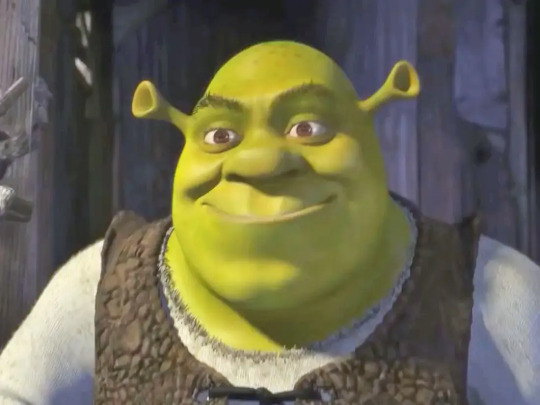
Tastes can change, you know? And it’s less about “What’s good about this now compared to before”, more of “Why would you like this now as opposed to before”? Unless allergic, you didn’t get why dark cola or hot chips tasted bad to you as a child, but when you grow up you can come to understand and appreciate it. Shouldn’t pressure yourself, that makes things worse, but things can certainly align in helping this newfound respect you get for something you’d believe you would never want again. That really is where I stand with Dreamworks’ Shrek. As a kid, while Toy Story left me traumatized for a while, Shrek left me side-eyeing with how crass and ugly it looked and I never wanted to think of it. But, as I grew up to respect animation a lot more, 2018 was where I looked back at Shrek and soon come to understand how wrong I was and how much greatness it has that I now consider it an all time great. And with it getting inducted into the Library of Congress, I thought it was finally time to present what I see in this film. Let’s do this right with...
The SOMEBODY
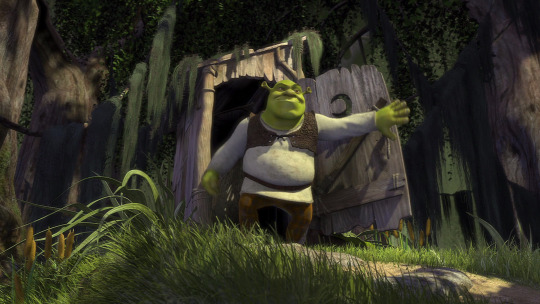
Now this frame has been meme’d to death. If there’s anything iconic about this film, ‘bout the franchise as a whole, it’s the exact moment when our main character charges out of his outhouse as Smash Mouth’s ‘All Star’ gets going. But this honestly just says a lot about Dreamworks’ direction from its previous films where compared to Disney that’ll take their time making the setup before getting into the hype point for its lead, Shrek gets going in one minute if we don’t count the logo intro. Not even The Emperor’s New Groove, which was going for the same tone before Shrek even released, took more of it’s time with the fairy tale aspect of it in its intro. Shrek literally wipes his ass with the fairy tale aspect before giving us the SOMEBODY, all around a minute. This frame really shows that this is sticking to the Disney formula in some way because it’s wasting no time getting into it. It represents the more brisk pace Shrek has with pulling you into what it’s gonna be about. This overall frame works in its thematic and parody aspect and I’ve yet to see anything top this exact moment, not even the greatest films I’ll ever remember.
But enough about the fact that I made a whole paragraph about this one frame of the movie. Let’s dive into what I say is a piece of the heart for this film.
The Earnestness
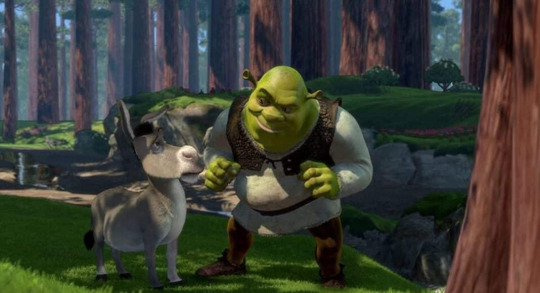
Speaking of Disney, you probably notice that their films have some cushioning in their presentation, like they generally don’t show things with a straightforward lens; there’s some theatrics in the way their best movies present themselves. That’s not a problem, mind you, but that helped me understand how Shrek does things very differently whether you consider it parody or not. While it throws mockery at the played out conventions associated with fairy tales, especially its most subtle jab at copyright, it doesn’t full on say fairy tales are annoying and bad. Hell, the film IS a fairy tale adapted from a fairy tale about a fookin’ OGRE that can eat lightning and kills with farts. But, it’s an accurate and earnest way to view a fairy tale from a somewhat realistic lens. Let’s take Shrek’s journey for instance.
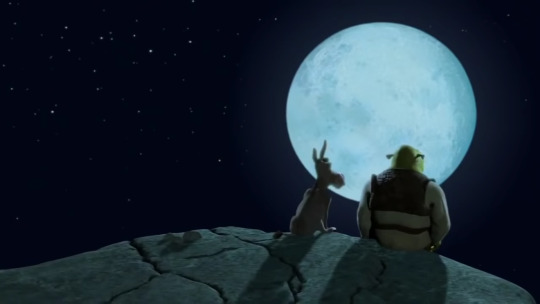
Typically, the main character would want to experience something more; explore new horizons, prove themselves, find their calling. Shrek off the bat doesn’t need or desire any of that. He’s content with his life, beside the angry mob he casually scares off, and throughout the film he’s not interested in anything else outside getting the squatters out his swamp. He happily makes a deal with the villain of the film to exile those innocent refugees off his land so he could then build a wall to keep everybody out. Bringing up Emperor’s New Groove again, Shrek and Kuzco are the few characters I know that are actively antagonistic even when they’re forced into their situation from outside forces. However unlike Kuzco that gets to be emperor again but learns humility, Shrek is in the same spot as before but learns that there are people out here that can love him for who he is. I can’t say there’s anything grand about that, but it doesn’t need to be unlike the many Disney or any film that tries to shower you with the grandest themes. The relationships Shrek has with Donkey and Fiona are the most grounded I’ve ever seen because they’re not only natural, they’re hardly dolled up with the bells and whistles made to either drum up the biggest laughs or tug the heart strings viciously. When I think about it, I honestly could see myself in Shrek. He isn’t made to be a legend, he isn’t some secret genius or lost prince, he’s just an every-man ogre that wants to live peacefully or meet SOMEBODY that doesn’t treat as someone to be feared or disgusted at. Everything Shrek says is something anybody could or would say if they were his shoes because he, and the film in general, is the most grounded without making it all distractedly meta or genre-savvy. This is generally helped by...
The Dounkaey
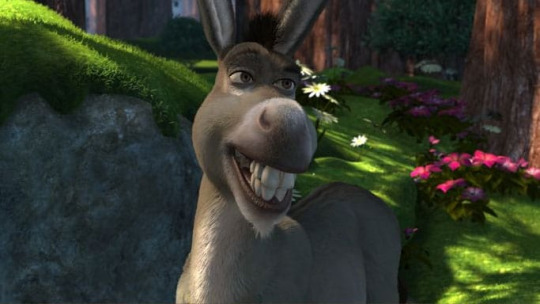
Everyone’s talked about how Donkey is the best confidant for Shrek and Fiona. How he’s most true to himself to where he’s the most openly musical character in the film, and how he’s the most balanced here with his comedic vs serious moments. But I gotta say it too: Donkey is one of the greatest sidekicks ever. He’s a motormouth, but is never annoying to where you wish he left the film. The couple times he is purposefully annoying, not for a joke, is when he knows Shrek isn’t being truthful. He truly gets to know Shrek on this journey, and is the character Shrek gets to capacity to actually loosen up to, so it’s fitting that he’d be the one to push Shrek when the ogre’s sounding more vague than usual. Even when he’s harshly insulted, Donkey doesn’t take it as bad as when Shrek kept trying to shut him out again in the 3rd act after the Hallejulah sequence which is the scene in every Shrek movie where’s there a super sad song because Shrek is alone and yadda ya. I’ll get to it in a bit, but he is as much responsible in providing Fiona that seed of doubt that Shrek wouldn’t love her as the ogre she is. Donkey is the greatest friend because he wants to be there for those who are okay with him being around, and while you could give and take sidekick animals in your notable films with them in it, this film really wouldn’t have happened without him. Speaking of Fiona, I won’t retread what’s been said before like with Donkey but I did want to bring up something I haven’t seen many talk about,,,
The Love for An Ogre
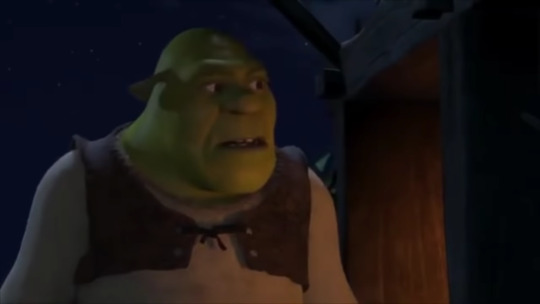
I’ve seen many say the scene where Shrek overhears Fiona talk about “Who could love an ugly beast?” and misinterprets that as her talking about him as a cliched or contrived downside to the film, but I feel that a defense can be made. It personally makes sense that Shrek would misinterpret that and take it personally because 1) Who else would Fiona be talking about? 2) How would he know she was talking with Donkey? 3) Why would he just barge in on her? 4) Has no one considered that this moment is parallel to when Fiona overhears Shrek’s conversation with Donkey the night before?
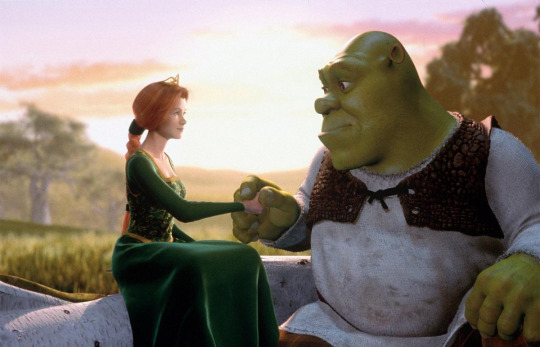
Fiona is very much the antithesis to Shrek’s character where she can very much be open about what she wants but is scared at the idea of anyone figuring out who she really is. She’ll gladly be gross, kick ass, eat the young of a bird she let explode, but won’t let anyone see her true face. That’s why her curse makes sense, and why Shrek would take a fondness to her despite her initial disdain of him rescuing her. Fiona’s a character where the surface level beauty is her weakness as opposed to Shrek where it’s internal. Which is why when she overhears Shrek open up to Donkey about his societal isolation, she’s soon more comfortable around him. And it’s why when she opens up to Donkey about her looks, Shrek would unfortunately take it personal enough. I ask again, why would Shrek barge in on a conversation he wasn’t aware of or who she was talking about to not take it about anything else but him when what he heard such a cut so deep, especially from a character that bears his similar issues? It also helps that Donkey was in on it, as Shrek feels reasonably betrayed by the only other person he’s come to appreciate in his life. Contrived as it seems, it’s thematically important and appropriate to the conflict of Shrek’s character and the film overall. Don’t know how this could be conveyed any other way because it adds up at least.

I just wanna know how Shrek got to Faarquard’s and back by sunrise like did he run cuz that looked like a huge distance to travel on foot but anyways...
I’m sure things could’ve worked out if Shrek knew, either by barging in that night or through Donkey, but I think it’s fitting that the climax takes place at the wedding. After Shrek and Donkey understand their friendship, after Donkey reciprocates the Dragon’s love (more ways than one), and when Shrek grasps the mistake he made to charge over to Fuccquad’s chapel, we get to...
The End
After everything, we get to the moment where Shrek and Fiona get to share their first kiss, Fiona permanently transforms into an ogre, and we get this exchange. One of my favorite exchanges in the whole film:
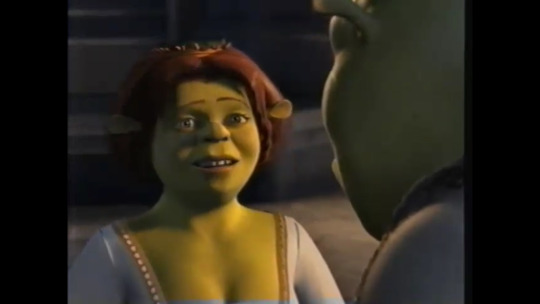
Shrek: “Are you all right?”
Fiona: “Well yes. But I don’t understand... I’m supposed to be beautiful.”
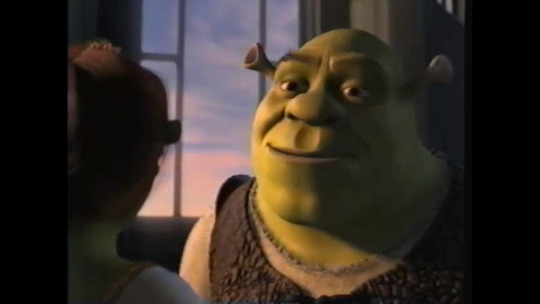
Shrek: “But you ARE beautiful”
We don’t need any other vows to understand their relationship was built up to this. This moment where Shrek can reaffirm Fiona’s feelings of being able to be herself in every way, because she allowed him to be himself in every way before. That’s that mutual love, baby, that just gets me every time and makes this film one of the best romance stories I know as well, even when it isn’t solely about the romance. This is Shrek’s story, and there’s nothing more touching than seeing this outcast not only get another to view him as a friend, not only someone to love, but people, if only a couple, to actually wanted to get to know him. I know Shrek 2 expands on this more, and it’s considered a golden sequel, but I will always cherish the first movie for how much it tells us off the bat while appearing as a “Take That” to Disney films. This is the genesis of Shrek feeling more accepted for himself and society and it just bears so much good commentary while being a good adventure nonetheless. Like you could say this film indeed has... dimensions? “You were trying to meme about la-”
The Conclusion
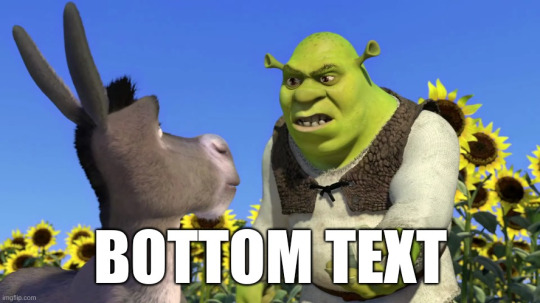
Mentioning it, I always had this thought with the conversation Shrek and Donkey had of why Shrek didn’t just “be an ogre” and pillage Fuccnut’s fortress. It’s possible Shrek could’ve taken out Faarquid himself, but that would mean being the beast he knows people have shunned him for, grabbed the torches and pitchfolks for, made him feel worse for. Shrek enjoys being an ogre, but he doesn’t like how society makes him feel lesser as an ogre. That really is what the four films have been about for him and what I’ve come to appreciate about these films personally. It can be easy to love yourself even when there are others out here that stand against you, but it’s hard to consider that anyone else could love you for who you are in spite of how you try to present yourself. But if there’s anything Shrek showed me, it’s that it’s possible. There can/will be people out here who appreciate the real you, will be there as much as you want to for them, and can help you realize more about yourself as opposed to suffering to silence eternally. Generally ideal, I know, but this film in the least offered me that thought in the most balanced way possible. It’s incredible how much of a tightrope this film has in its parody and sincerity and that makes its induction in the National Film Registry and being the first ever Best Animated Award winner pretty justified all things considered.

I know this film, the character, has been a meme over the years. As Schaffrillas mentions in his video, the direction Dreamworks made because of Shrek’s success kinda turned it into a heel people clowned on because, in theory, it was nothing but a joke with the onions and the swamp and IT’S NEVER OGRE. Then again, like I said in the beginning, tastes change. I’d say with Schaff’s masterful analyses on the film series and 3GI’s Shrek Retold and Shrekfest, the perception of the film sure enough shifted like the perception of Megamind. It’s one thing for a movie to blow people away or leave them thinking it’s horrible beyond belief, it’s another to take the time to then look back and see how those feelings have changed. For Shrek, it’s a film that was able to trudge out of the meme era to be a film many consider a strong, rewatchable, and unique. Like the beauty of Spongebob, Shrek is a considered a classic because as in the times as it appeared when it released, this film actually stood on its own with the most enjoyable and meaningful timelessness, exploring the desired love for the self, that deserves to be recognized. What else can I say, people?
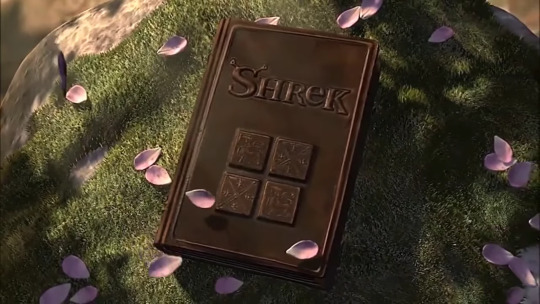
It’s The Best
#Shrek#dreamworks#dreamworks animation#animation#movies#cartoons#reviews#analysis#long post#Good Stuff
54 notes
·
View notes
Text
My 10 favourite... beefcake animes!
Okay yes, I realise that this is a rather weird title. I had originally thought to call it something along the lines of my favourite martial arts or fighting animes, but because the animes don’t always fall into that category, I decided to call a spade, a spade (or a beefcake, a beefcake) and admit that, most times sometimes, I just enjoy animes with muscular guys in them. That’s not to forget the ladies though because some of these shows also feature some rather muscular ladies in the mix too. So there’s something for everyone!
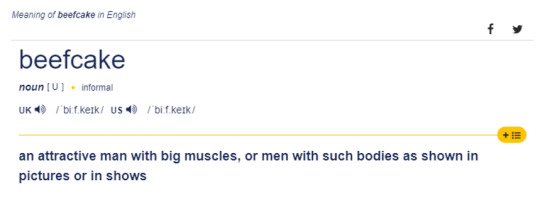
So, in no particular order (because the genres are sometimes different so making comparisons wouldn’t be fair):
1. Street Fighter series.
Hardly a surprise considering that this is a series that has a legacy firmly placed in the gaming world. Although you don’t really need to know who’s who in order to watch these shows, it doesn’t hurt to know a little about the characters before you jump in - mainly because the creators assume that those who watch it are fans of the show. Expect a fair amount of fighting (the name gives that one away), lots of bromance (Ryu and Ken 4eva!) and the eternal fight of good vs. evil (which is usually the plot of every show/movie)! Even if you aren’t familiar with Ryu & co., the show won’t lead you astray so you can watch without worry. Oh and let me just say - Chun Li is ma gurl! If you want to see a woman that’s not only beautiful but can also kick your ass, then watch these shows - especially Street Fight II the movie!
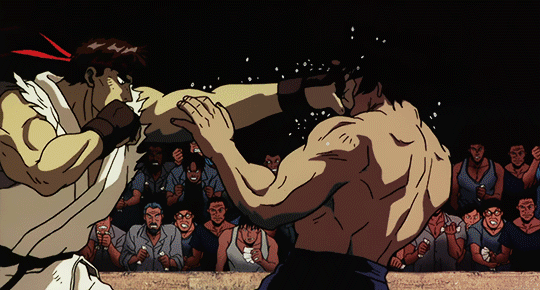
2. Hajime no Ippo.
One of my most favourite sports animes of all time which tells the tale of Makunouchi Ippo and his rise up the ranks of the boxing world. He starts off as a kid that just wants to get stronger so that he can fend off the bullies who harass him. Sick of his weak self (and after a couple of incidents here and there), Ippo joins a boxing gym, starting from scratch and going through basic training. His coach sees his potential and helps shape Ippo into a power boxer who fights head on and never backs down from the fight. Throughout the series, we get to know the other boxers in the gym as well as the competitors that they face, and we watch them battle it out in the ring. It’s a story with a great balance of sports, a sprinkling of slice of life (well, the life of a boxer) and comedy. And, of course, boxing boys come with boxing bodies... and I’m not complaining! And if you enjoy this and want more, try either “Ashita no Joe” (old school classic) or it’s more recent spin-off, “Megalo Box”. Oh and in terms of strong women - no one beats Ippo’s mom! She’s a powerhouse!

3. Baki the Grappler.
More of an MMA vibe with this one - it’s about a kid (he’s like 13 when we first meet him) who has been raised to be a fighter since he was born - his mother gets him the best trainers and equipment money can buy. He eventually feels like he’s outgrown the traditional training method and starts to find other ways to become a better fighter, which includes following his fathers footsteps - training the same way he did and with the people he did - and taking on some of the other fighters he meets along the way. After an altercation with his father (using that term rather lightly), Baki’s path eventually leads to the underground fight scene where challengers can test their strength and face off against each other in an anything-goes type of fight, using whatever techniques, power and skills they have at their disposal. And Baki’s ultimate goal? To defeat his father! It’s got some family drama as the foundation, but when it comes to beefcakes, there’s no shortage here - even if it is a 17-year old kid looking like a grown-ass man. Oh, best to be aware that (excluding the OVAs) there 3 seasons of Baki - the anime series from 2001 and the 2018 Netflix version which covers the "Most Evil Death Row Convicts" arc.
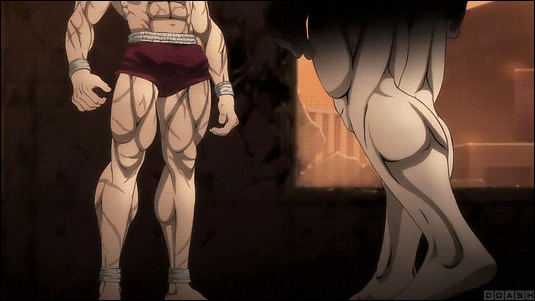
4. Kengan Ashura.
When I first started watching this, the first thing I thought was - ahhh! this reminds me of Baki! And, indeed, there are quite a few elements that are similar. There isn’t any family drama here but there is an underground fight scene where anything goes in terms of fight style. However, the premise here is that the fighters don’t fight for themselves (well, not officially anyway) but that they fight for various companies who settle their business disputes via these types of organised “kengan” matches. It eventually reaches a situation where some of the other businessmen wish to get rid of the current Kengan chairman, and so this chairman organises a huge battle royale for any companies that wish to enter. The prize? The owner of the winning company gets to be the next chairman! This sets the stage for a number of one-on-one showdowns between the various fighter representatives. In terms of background stories, we have two main protagonists and their stories. The one is about a salaryman (turned “CEO”) and his life, as well his relationship with his son, and the other is about a fighter and the vendetta he holds against another fighter for a past incident. Personally, I love the way the fights are presented in this show - not only because of the eye-candy - but because it really does feel like you’re at a grand show! Oh, and unlike Baki, at least most of the fighers are adults.
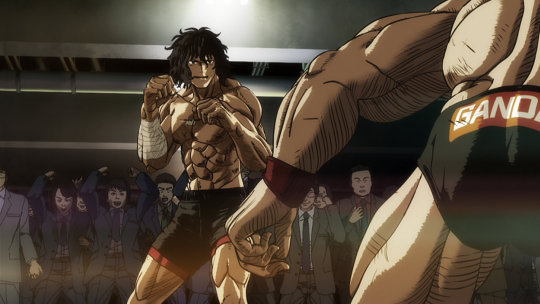
5. Golden Kamuy.
Bring on the boys! Honestly one of the most entertaining shows I’ve watched in a while (and one where I demand that there be another season at least!) and also culturally/historically interesting too. It’s set around the time of the Russo-Japanese war and follows the story of Immortal Sugimoto - a soldier who left active service and finds out that there may be Ainu gold hidden somewhere in Hokkaido. The only problem is that the map has been tattooed in pieces, onto the torsos of various prisoners, most of whom have dispersed to different areas. Nevertheless, thus begins the hunt for the map! Along the way, Sugimoto meets various people along the way - making allies with some and enemies with others - all of whom are associated with each other in interconnecting ways. And all of whom are working toward one goal - get the gold! It’s a brilliant show that’s got some fighting, some mystery, some espionage vibes, some comedy (some of which is could be considered dark and/or weird) and some feels. It balances it all out and makes for an interesting and entertaining watch. Oh, and let’s not forget - a very enjoyable watch too! Mm mm mmm...

6. All Out!!
Another sport anime here, but this time it’s rugby! As someone from a country where rugby is a staple, national sport, this was totally up my ally! The premise is similar to most other school-based sports animes - a kid who’s self-conscious about his height joins the rugby team and learns to get along with the other boys as he trains and works together with them as part of the team. This is not only so that he can help the team improve, but to also prove his own worth. The team goes through training camps and they play against other schools, getting to know some of the opposing teams’ members and establishing some rivalries along the way. It’s pretty typical fare, but damn are these boys stacked! It’s pretty accurate though since rugby is a contact sport which requires some power (and apparently some short, tight shorts) to get the job done. It’s a light watch, but that eye candy is truly sweet!
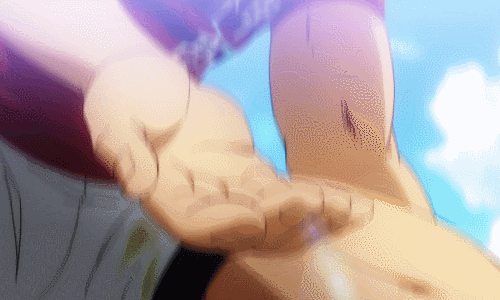
7. Tiger Mask W.
From rugby to wrestling! This actually a continuation of sorts to the original Tiger Mask and Tiger Mask II series, building on the legacy and keeping related in the same sphere, but not directly incorporating the older characters. Unfortunately, the original series is hella hard to get hold of but even without it, you can watch Tiger Mask W without much of an issue. So the story is about a guy who had decided to join a wrestling gym and was pretty happy there until the gym was destroyed by another rival gym. Vowing to take that other gym down, he strikes out on his own and eventually joins one of the national wrestling associations, working in their match roster. But it’s all so that he can reach his goal of taking down that other gym by defeating the players supported by them. Enter into the ring various wrestling friends and both friendly and unfriendly rivals (including an old friend - bromance anyone?) and you get plenty of matches, plenty of muscles and some satisfying action! They also don’t forget the female wrestlers, which is a nice touch! Another one that’s light enough to enjoy at face value - much like how you’d enjoy real wrestling too.
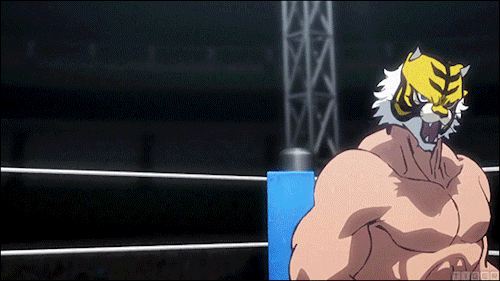
8. Gifuu Doudou!! Kanetsugu to Keiji.
A historical vibe with this one - it’s actually based on the spin-off of the original manga, “Keiji” which was created by Tetsuo Hara. And if that name doesn’t ring a bell, check number 10 on this list and you’ll know who I’m talking about - that’s right, it’s the guy who worked on Hokuto no Ken - and that should immediately give you an idea as to why this show is on the list. It’s a period piece about the friendship between Maeda Keiji and Naoe Kanetsugu - both of whom found their accomplishments on the battlefield. It’s told in hindsight, where they sit together, have a drink or three and reminisce about their younger days and what it took to get to where they are now. I wasn’t quite sure what to expect, but it was pretty entertaining - especially when you see just how clever these guys were when it came to political maneuvering as well as in a fight. Of course, they’re pretty high in the beefcake stakes so if you like your men manly, then you’ve come to the right era.
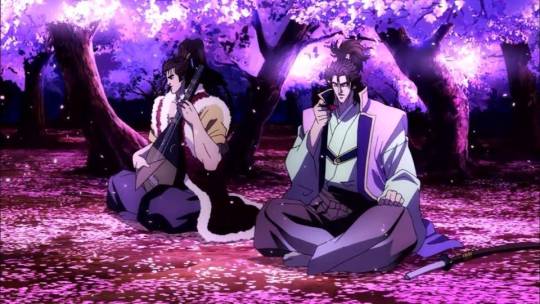
9. Dragon Ball series.
I’m pretty sure that I don’t have to talk about this anime, but in the interest of completeness, let me give you the wiki breakdown about what this anime is about: “The series follows the adventures of the protagonist, Son Goku, from his childhood through adulthood as he trains in martial arts. He spents his life far from civilization, until he is found by Bloomer, a teen girl who encourages him to explore the world in search of the seven orbs known as the Dragon Balls, which summon a wish-granting dragon when gathered. Along his journey, Goku makes several friends and battles a wide variety of villains, many of whom also seek the Dragon Balls.” (source). Of course, this is continued throughout the various series that follow, where Goku has his own family etc. But when it comes to the muscle factor in this show, it’s got it where it counts - everywhere! It’s a classic for a reason so even if you aren’t into beefcake guys, you should still probably watch it if you haven’t already.
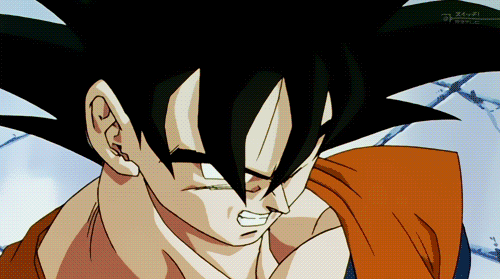
10. Hokuto no Ken.
It just wouldn’t feel right if I had to leave this off the list because when someone says “manly anime”, I’m betting that 99.9% of the time most people think about Hokuto no Ken / Fist of the North Star. It’s the post-apocalyptic era and times are tough, with everyone fighting to survive with what little there is on the planet. Some guys want to be rulers, some guys want to be thugs, but one guy just wants to find his fiancee and do what he can to right the wrongs of the world and make a difference to the people he meets. That one man is, of course, Kenshiro. It’s full-tilt action, usually incorporating martial arts through the various fighting styles of the characters - whether it’s Hokuto Shinken, Nanto Seiken or sometimes just brute force and good old hand-to-hand combat. There’s a few female characters here and there who also kick ass so it isn’t completely one-sided, but they usually end up getting saved by the dudes so take that with a pinch of salt. Post-apocalyptic world or not, these guys sure can maintain their physiques. And when it comes time for a fight, you best believe they pull no punches! If you like pure fighting animes where you get to see people explode each episode, followed by the most epic line ever said in anime, then this is the one!
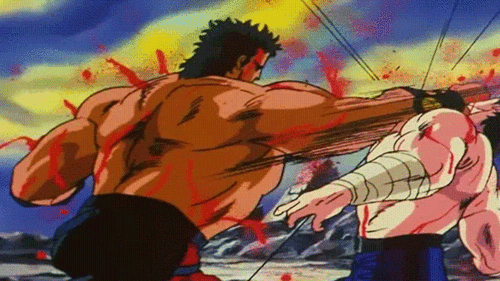
Honourable mentions.
...because, can we really do without more muscular men and women in our lives?
1. Terra Formars - if you’re looking specifically for that muscular vibe, then try season 1. While I enjoyed both, season 1 had better animation (for me) and they all looked badass when defeating those nasty roaches - both the men and the ladies!
2. Hinomaru Sumo - a sports anime that revolves around a newly formed high school sumo club and the career path of the main protagonist. Informative if you don’t know much about sumo and, as expected, loads of meaty guys aiming for victory and aiming for the position of yokozuna.
3. Jojo’s Bizarre Adventure - another show that hardly requires an introduction and would probably take way too long to explain considering how many Jojo’s there are, but rest assured, the guys are packed, stacked and ready to attack!
4. One Punch Man - if only because there a few characters who fit the beefcake category perfectly, e.g. Suiryu (hello there!), Garou and Tanktop Master to name a few. An anime that’s some parts serious, some part hilarious but always flipping shounen tropes on its head.
5. Sengoku Basara - also, not completely beefed out, but there are a few characters who would make the grade, e.g. Maeda Keiji (dejavu from number 8?) and Oda Nobunaga. Another period anime, based on a Capcom game, that uses a lot of poetic licence to make it an exciting watch with very memorable characters.
6. Free! - “Make us free na Splash! Kasaneta... 👏 👏 !” Swimmers bodies - that is all. If you’ve ever seen a swimmer’s bodies in real life, you’ll know what I mean ‘cos they have muscles in all the right places. A slice-of-life sports anime that revolves around high school boys (who eventually become college boys) who engage in competitive swimming.
7. Air Master - The ladies take over in this one, which is a show that revolves around street fighting and the goal of those various street fighters and martial artists to become number 1 on the Fukamichi Rankings. It’s more of that underground fight scene vibe but the main protagonist is a gymnast-turned-street fighter who takes on anyone who’ll challenge her (man or woman) and usually kick their ass. It’s got a quirky/weird sense of humour to it, but that’s part of why I liked it.
Well, I’m pretty sure that there are other shows that I’ve missed, and mountains of characters who have that A-grade beef, but I tried to choose shows that specifically have that muscular aesthetic as a default setting in the show. Hopefully I hit the mark here, sharing my faves with you, but if there’s some show or character that I absolutely must see, feel free to let me know! Because just like Tanigaki’s shirt, I’m always open to suggestions.
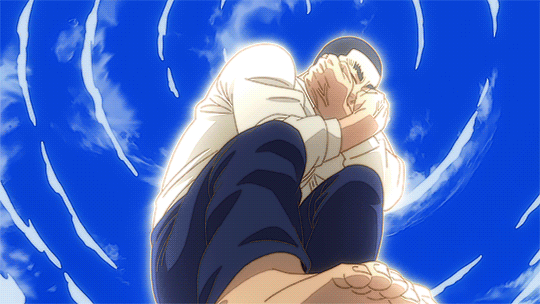
#10 favourite animes#beefcake genre#it's not a thing#but i think it should be#muscular anime characters#street fighter#hajime no ippo#baki the grappler#kengan ashura#golden kamuy#all out!!#tiger mask w#gifuu doudou#dragon ball#hokuto no ken#fist of the north star#terra formars#hinomaru sumo#jojo's bizarre adventure#one punch man#sengoku basara#free!#air master
2K notes
·
View notes
Text
“It Makes Me Wanna Keep Him At Arm’s Length” An Overview On Katsuki Bakugo’s Development
[I should by no means be the one writing this analysis, but here we are. Obviously it’s an overview on Katsuki’s character development, but there’s a bit more to it than that. Keep reading if you want the details.]
Table of Contents
i) Prologue
I) A Brief Explanation
II) The “What The F*** Is Your Existence” Phase
II.A) Breaking The Barriers
III) The “I Can’t Let You Get Ahead Of Me” Phase
IV) The “Why Don’t You Care About Yourself” Phase
V) Final Address+Conclusion
Word Count: 4415
[Warning: Contains manga spoilers up to Ch. 284. Will also include spoilers for the movies and OVAs, as well as the special Deku & Bakugo: Rising two-shot manga. Reader’s discretion is advised. Not scared off yet? Good. Let’s do this.]
i) Prologue
Alright, no beating around the bush, I guess.
We all know this has to deal with Ch. 284, and the milestone that came with it. We got a rare look inside Katsuki’s perspective, and we saw firsthand how much his perspective has changed from the start of the story. I don’t think we’ve ever gotten such an in-depth look into Katsuki’s psyche since Deku vs Kacchan 2. It’s honestly impressive.
...which is why I’m so confused by a certain kind of response to it.
When you look past the swarms of tumblr posts absolutely losing their s*** over Katsuki getting further character development, you come across an… admittedly troubling response. The idea that “Katsuki always cared.” The idea that as early as the Battle Trial, if not middle school, Katsuki was secretly keeping an eye out for Izuku in their tumultuous relationship.
...no. Just-. No, what the-
I’ll get to why this particular response pisses me off in a bit, but before that, I wanna give a run down of Katsuki’s development, according to the narrative. Anyone who’s been around my blog long enough knows that I don’t exactly hold Katsuki in good graces. (Pretty much the opposite, actually.) However, in light of recent developments, that’s not what this post is gonna be focusing on. And as such, I’ll keep the snark and branch conversations to a minimum… to the best of my abilities.
So… how are we gonna do this?
I) A Brief Explanation
After we finish this brief “tutorial” section, the next three segments of the post will cover the various time frames of Katsuki’s development. I’ll be going through a general rundown of Katsuki’s perspective and the various evidence points that lead me to my conclusions. It’s essentially a glorified retelling. Sound good? Alrighty then!
II) The “What The F*** Is Your Existence” Phase
Time Frame: Ch. 1-Ch. 116 [Sludge Villain Arc-Late Provisional Hero License Exam Arc]
In case the Prologue didn’t make things clear, let me spell it out: Katsuki didn’t always care.
At least, he didn’t “always care” in the positive sense.
To clarify, this isn’t just 3rd Year Middle School Katsuki to UA Katsuki. This is all the way back to the River Incident. Katsuki has had this mentality for that long and then some when you shift out of backstory territory. We’re talking about the same kid who nearly murdered Izuku in the Battle Trial, blasted Izuku to kingdom come in the Training of the Dead OVA, and decked Izuku during the Final Exams. So…
The following hinges majorly on the line Katsuki stated in Chapter 284, and the title of this analysis: “It makes me wanna keep him at arm’s length.” Contrary to popular belief, this does not just apply to the idea that Katsuki wants to stick around Izuku to keep him from destroying himself.
...it’s also a major contributor to the reason Katsuki bullied Izuku in the past.
So let’s backtrack to the River incident. Katsuki takes one wrong step on a log, slips, and falls down into the river below. Izuku is the only one that goes down to help him. This infuriates Katsuki because he was fine, as was said by him and everyone but Izuku that was present that day. This is also the first time Katsuki becomes aware of something he echoes in the Ch. 284 flashback:
“He just… Deep down, he doesn’t take himself into account, y’know?”
This is Katsuki’s first run in with Izuku’s inherent selflessness. Initially, he takes it as pity; in his words, Izuku is “looking down on him.” And this bothers him a great deal. Then when it comes to Quirks, Katsuki gets one and Izuku doesn’t. This assures Katsuki of something he shortly discovered previously: Izuku isn’t all that special.
It’s a brief comfort. Because Izuku hasn’t taken the damn hint and stopped hanging out with him and his friends. The Quirked kids. The normal kids.
And worst still, he’s willing to get in Katsuki’s way just because someone else is in his line of fire. In the back of his mind, it’s the River Incident all over again, though he’s not being feared for; he’s being feared of. It’s all wrong. Deku isn’t strong like the rest of them. Deku can’t be a hero. Deku knows that.
...he knows that he doesn’t stand a chance, right? He knows how the world really works. Is he… is he putting on an act?
One of the few remarkable traits Katsuki has right from the get-go is his disdain against dishonesty. So, when he sees Izuku putting on a brave face and acting like a hero, and Katsuki decides that Izuku’s just “pretending,” Katsuki takes the matter into his own hands. He’ll get Izuku to show his true colors in due time. That’s what heroes do, right? Take down the bad guys? And Izuku faking about caring for others when everyone else clearly puts themselves first and foremost sounds pretty bad guy-like, at least at the time.
So, Izuku keeps on trucking, occasionally trying to join back up with Katsuki’s group on a near frequent basis. Even when that fails, he tries his damnedest to catch up.
But what many people forget is that at some point, Izuku stopped following, at least actively.
By Chapter 1, he’s making sure to keep from drawing attention to himself. He’s not as enthusiastic as everyone else in the class, he tries backing away from Katsuki and shrinking down on himself, tries defusing the situation. That doesn’t sound like Izuku’s still trying to keep up. Even in the special two-shot manga dedicated to Heroes: Rising, Izuku isn’t the one to draw attention to Katsuki’s presence. And even when he does go after Katsuki and the villain, his attention is more so focused on the villain, thoughts of staying out of Katsuki’s way to not offend him likely somewhere in his mind.
So then why does Katsuki keep antagonizing him in the first chapter of canon proper? And even before that, most likely?
“It makes me wanna keep him at arm’s length.”
...Izuku didn’t stop being Izuku. Izuku didn’t stop being selfless.
And his selflessness is what pisses Katsuki off to no end. So, he keeps pursuing Izuku, keeps trying to get him to “drop the act.” Makes him a “punching bag,” as Izuku states in Chapter 8. Because the way things work, Izuku should not be trying to be a hero. He should not be trying to put on a brave face when he’s scared s***less. He should not be sticking his neck out for others when he doesn’t (or rather, didn’t) have anything to stick up for himself.
Katsuki was born with something that made everyone consider him prime hero material. Izuku was born without that, and was considered the opposite… and yet, he still tries.
And this character trait, this selflessness, it drives Katsuki insane. And it continues to do so well beyond the Battle Trial Arc. Even when Katsuki is able to begrudgingly accept that Quirkless Deku has a Quirk now, somehow, his selflessness continues to bring Katsuki grief. While it’s never inherently brought up, this is the dividing factor between Izuku’s fight against Shoto in the Sport’s Festival and Katsuki’s fight with Shoto in the Sport’s Festival.
Izuku was willing to go all out at the cost of himself just so Shoto could accept what was his. Katsuki just wanted a good brawl, to be the undisputed first place.
This even continues well into the Final Exams, though the fact that Katsuki is running high on arrogance and anger does nothing to soothe matters. It takes a deck to face and later an explosive kabedon wall smash to get Izuku and Katsuki working together, and let’s not forget that when Izuku was trying to get Katsuki to realize they were still fighting All Might, regardless of whatever handicaps he may or may not have, he gets decked in the nose for his efforts. While it’s technically a subtler play on Izuku’s selflessness and concern for others, Katsuki likely took it as further mockery, another attempt for Deku to try and get under his skin and throw him off.
In any case, throughout this time period, Katsuki cares f*** all for Izuku or his philosophy, opting to brute force things up until the very end of the time frame. But what causes the eventual shift?
II.A) Breaking The Barriers
A number of things, actually.
None of the proceeding events ever do a clean cut on Katsuki’s worldview. It’s more like chiseling through a wall than breaking it down with a hammer.
The Sludge Villain is the first hint that Izuku might not be faking and Katsuki might not be at the top. While many claim that Katsuki leaves Izuku alone because he feels indebted to him but doesn’t want to admit it, it’s more than likely that he’s more focused on his own self-loathing. This incident is what defines him for a good chunk of the series, to his chagrin.
The Battle Trial is just another nail in the eventual coffin. Katsuki thinks he’s finally got Izuku right where he wants him, only for Izuku to pull a 500 IQ play and prioritize the exercise over his and Katsuki’s squabbles, taking the brunt of Katsuki’s attack and attention while giving Ochako the opportunity to capture the bomb. That look of frustration is Katsuki realizing that not only did Izuku get ahead, he got ahead with the very thing Katsuki despises. Needless to say, it f***s with him well until the aftermath outside of UA’s gate.
Shoto refusing to use his flames is another chip off the marble that is Katsuki’s pride. It reinforces the idea that Izuku is doing something that Katsuki isn’t, something that Izuku shouldn’t have in the first place, beyond a Quirk at least. So, Katsuki rages, because he can’t understand why it’s such a big deal, in both Izuku’s and Shoto’s cases.
The Final Exams just hammer the point home further. Katsuki’s one-track minded attempts to bring down All Might are met with no results. He would have failed that exam if it wasn’t for Izuku’s selflessness or Katsuki “lowering himself” to cooperate with him. Had Katsuki not gotten decked in the face and dragged off or got saved at the last minute while he was knocked out, he definitely would have failed on account of becoming a liability.
The Training Camp attack is an odd mix of Katsuki’s current philosophy and the next stage in it. He knows Izuku’s gonna go and save his ass, and he wants no part of that because hasn’t he made him suffer enough already? Hasn’t he already proved time and time again that he’s getting better, despite the fact that Katsuki doesn’t want or believe it? Despite the fact that it shouldn’t even be happening if things were right in the world? Izuku does recognize Katsuki’s wounded pride, however, which is instrumental in getting him out of All For One’s clutches during Kamino.
If we briefly direct our attention to the Make It! Do-Or-Die Survival Training! OVA, Katsuki is pretty adamant on claiming he only got the power back on in the underground mall to complete the exercise. And I don’t think that’s Katsuki’s “tsundere” talking, either: I genuinely believe that Katsuki’s only thoughts at the moment was getting the exercise done. Everyone else was just secondary. And remember, Katsuki hates dishonesty, which is probably why he doesn’t take credit for “saving” Izuku and Shoto. While his actions did save the two of them and everyone else in the mall, that wasn’t his intention, which is an interesting flip on Izuku’s performance back in the Battle Trial. Couple that with the fact that Katsuki is injured (and therefore weak, and in need of help), and it’s no wonder he’s in a sour mood towards the end of it all.
And this sour mood carries over to the final nail in his coffin: the Provisional License Exam. He only gets by the first half because other people had the sense to tag along, but the second half regards his undoing because he still doesn’t get the whole selfless aspect of saving people in the second half of the exam. This was also foreshadowed back in the aforementioned OVA with Katsuki’s excessive animosity towards the victim dummy. Whether they be real or fake, Katsuki’s disregard of either victim doesn’t grant him his hero license.
This is the straw that breaks the camel's back for Katsuki. And ultimately, this sparks the start in his shift to the second phase of his development.
III) The “I Can’t Let You Get Ahead Of Me” Phase
Time Frame: Ch. 117-~Ch. 257 [Late Provisional Hero License Exam Arc-Early Paranormal Liberation War Arc]
Since this is only the second phase of Katsuki’s development (and given that this is Katsuki we’re talking about), don’t expect to get much of an upgrade with this shift.
Essentially, it boils down to two things: Katsuki stops viewing Izuku as an annoyance, and starts viewing him as an obstacle. Simultaneously, he starts seeing the viability of saving, at least as a tool in a hero’s kit.
Let me explain.
While Deku vs Kacchan 2 is the first time Izuku and Katsuki have attempted to talk out their issues… not much gets addressed. Sure, Katsuki becomes aware of Izuku not looking down on him, but Izuku is never made aware of the deeper issues regarding Katsuki’s loathing beyond that. It primarily serves as a half-barebones narrative checkpoint, a segway for Katsuki to get in on the secret of One For All.
...let’s also talk about that, shall we?
So Izuku’s been getting better as a hero and with his Quirk. Then Katsuki finds out after he gets kidnapped and rescued that Izuku is the successor to their mutual idol. And that’s after essentially being told he can’t be a hero in his current state due to the PLE. And what is his usual response to adversity? He decides to get ahead of it.
He’ll surpass Class 1-A so there won’t be another Battle Trial. He’ll surpass Izuku and One For All so he can truly claim that he’s the best of the best.
Unfortunately, we don’t get to see more of this development until the Joint Training Arc. However, keep in mind that this is only the second stage. Katsuki wants to prove that he’s the best, so of course he’s gonna step up his game. That means taking advice from the LITERAL (former) #1 HERO, and making the victory as flawless as possible. After all, Katsuki himself said in Chapter 208:
“I’ve decided! We’re gonna win this match with a perfect victory! 4-0, with everyone unscathed! That’s the kind of victory there is for the strongest guys out there!”
...it might be a slight exaggeration when he says he’s hardly changed at the end of that chapter, but then again it is a stretch to even call it an exaggeration.
That aside, Katsuki also makes it part of his agenda to keep tabs on OFA. This would fit into the “Katsuki secretly cares” agenda, but we haven’t reached that point. Right now, in these moments, Katsuki figures that if One For All starts getting freaky, he wants to know about it so he can get a leg up. And maybe part of him still wants to call Izuku out.
He was minorly ticked when Izuku allowed himself to make a mistake during their unauthorized fight. And he constantly reminds Izuku to not forget that he’s supposed to surpass him (or the other way around).
Taking off the rose-colored glasses for a moment, it does make sense for Katsuki to say this beyond the context of positive motivation. We are talking about the same Katsuki who lashed out at Shoto for holding back. It’s reasonable to assume that he doesn’t want Izuku to do the same, and lagging behind more or less equates to holding back.
And Katsuki still isn’t completely invested in Izuku’s training for Izuku’s sake. After the Joint Training, Katsuki tries getting Izuku to manifest Black Whip again, and nopes out shortly afterwards when nothing comes of their sparring sessions in Chapter 217. This still isn’t the Katsuki we see in the 284 flashback. He’s still got a ways to go.
Yes, this even rings true for Katsuki during Heroes: Rising. While the film might be the ultimate Bakudeku dream come true, there really isn’t… much depth in regards to Izuku and Katsuki’s past. Y’know, the thing that most people are hoping gets resolved? It only gets referenced a few times in the film, but doesn’t overall factor into anything meaningful. Most of the time when Izuku and Katsuki team up, Katsuki only gets to the fight because he wants to throw hands with villains on an island where (if the status quo had remained unchanged) was likely selected because it had little to no serious villain activity. It just so happens that protecting and working with Izuku is an unintended byproduct of these fights. Katsuki even drops the infamous “lowering myself to work with Deku” line just before the big climax. And even with the transfer of OFA to Katsuki, it strikes less as overcoming a longstanding obstacle and more as plot convenience, especially since by the end of the fight OFA nopes back into Izuku so hard that Katsuki gets mind wiped about the whole thing.
Even during the Endeavor Arc, we don’t see much growth beyond the Ending fight, where Katsuki prioritizes saving Natsuo over throwing hands like he usually would, learning to take saving as more than a tool. This is significant considering it’s Katsuki, but unfortunately, there’s not much else thereafter. The entire arc won’t get referenced as an overall stepping stone until Ch. 284.
And thus, we head to the final phase.
IV) The “Why Don’t You Care About Yourself” Phase
Time Frame: ~Ch. 257-Ch. 284 [Early Paranormal Liberation War Arc-Paranormal Liberation War Arc (Present)]
So here’s an interesting tidbit: Katsuki can’t handle nonphysical confrontation.
Leave him with the fact that his kidnapping could have gotten most of the class expelled because they decided to go rescue him or avoided such while knowing of the operation? He’ll pay back Eijiro for the expensive night vision goggles and make Denki suffer Quirk overuse so he doesn’t need to be reminded.
Get stuck in the middle of a Todoroki Family Drama scene? He’ll try bragging about how he did better than the current #1 Hero to attempt curbing off the situation.
Put him in a discussion with Izuku where they address his additional Quirk manifestations and the full weight of his potential/legacy? Katsuki will brag about having a skill already in his toolkit to ignore the fact that he has the potential to fall behind.
This defines the earlier days of this phase. We don’t see what happens in the timeframe between that and the start of the War Arc until the Chapter 284 flashback. I believe that during the gap between 257 and this flashback, Katsuki allowed himself to process the full weight of what he and Izuku were told during that meeting.
And this marks one of his biggest revelations to date.
Izuku’s selflessness is no longer something annoying. It’s a potential fatal flaw.
For the first time, it’s hitting Katsuki that Izuku is no longer an obstacle, or just an obstacle. Izuku is a person who is working himself to the bone and past that, who would die at the drop of the hat if he thought the payoff was well worth it. He’s finally starting to see that what Izuku is doing to himself is dangerous, and he wants to know what he can do to prevent the serious ramifications.
This is a big phase in his development, no doubt, but um… it’s not the last phase.
If I’m being honest, we’re nowhere close. Why? Well, two reasons:
A) Katsuki still has yet to properly take a loss.
Any and all of Katsuki’s losses are either in his head or narratively negated. And his disproportionate win/loss ratio doesn’t do him any favors either. He’s culminated a philosophy that he can’t and shouldn’t lose, but losing is a crucial aspect of improvement and being human in general. In the case of the story, Chapter 275 suggests that Katsuki wants to face off against Tomura as payback for Kamino. He essentially wants to extend the narrative and treat that loss like a delayed win, as if the loss hadn’t happened yet. Many people claim that this is a bluff he used to cover his true intentions of keeping an eye on Izuku, but I don’t think that’s the case. While sticking by Izuku is a contributing factor, getting a win is equally so, because Katsuki hasn’t properly adjusted to a loss. His strategy for dealing with any kind of loss is just to bulldoze through it like nothing happened, instead of taking the time to understand why he lost and to apply that knowledge for future encounters.
Be aware of your surroundings during the Sludge Villain.
Focus on your priorities and communicate with others during the Battle Trial.
Don’t ignore the situation just to focus on your own intentions during the Training Camp attack.
HELP PEOPLE during the Provisional License Exam.
There are so many lessons Katsuki could have learned sooner if he had taken the time to properly digest his losses. But he didn’t. He still doesn’t. He might have learned some of them eventually, but the fact remains that he nearly ran head first into a suicide mission just because he couldn’t take the loss and was dead set on getting even.
And keep in mind, Katsuki was lamenting on struggling to keep up with Izuku earlier before their encounter with Tomura, and how he couldn’t afford to stay a loser, so this is likely less far-fetched than you think.
Okay, so then what’s the second reason Katsuki’s development is far from over?
B) He hasn’t fully connected the dots on what he did to Izuku.
So far, Katsuki has recognized that he was off-put by Izuku’s selflessness, and that he bullied him over that.
What he hasn’t recognized is how much of a role he played personally in that part of Izuku’s personality, or at least it’s present day incarnation.
Let me clarify a bit. Katsuki is aware that he was distrubed by Izuku’s selflessness. He is aware that bullied him and that, at some degree, was wrong. But I don’t think he’s quite connected the dots on how his intervention has led to Izuku’s current brand of martyrdom.
At the start of the series, Izuku just cares about others. After making sure he gets down to the river safely, he’s willing to lend a hand to Katsuki, who fell from a pretty concerning height ig we’re being honest.
But this unnerves Katsuki. And it leads to his physical altercations with Izuku from time to time.
Remember, Izuku followed Katsuki at the time, but somewhere down the line he stopped. But he never stopped being Izuku, so Katsuki continued to pursue him. Izuku had already been willing to give up in some degree on ever keeping up with Katsuki the way he used to. He knew, at some level, that he wasn’t accepted.
That he wasn’t worth as much as everyone else.
Katsuki bullied Izuku because he was selfless. But Katsuki’s bullying, coupled with the rest of society’s ostracization, twisted and warped that selflessness with low self-esteem, low self-worth, and self-destructive tendencies. Katsuki wasn’t the sole bully of Izuku, but he was a primary perpetrator. And his actions only made the very thing he despised so, so much worse.
...and until he can recognize THAT aspect of his relationship with Izuku, his journey is far from over.
So yeah, Katsuki’s making progress, but we’re still not out of the woods yet.
V) Final Address+Conclusion
So now for the obvious question: why did I write all of this?
I said it at the beginning, about how some people claimed that Katsuki cared all along. I brought up a bit about how it pissed me off. Why, exactly?
Because when people insist that Katsuki threatening Izuku to not go to UA comes from a place of concern, they disregard Chapter 1 Katsuki’s gigantic ego and utter disregard for others, much less so for Izuku.
Because when people insist that Katsuki’s shocked face at the end of the Battle Trial was because he was upset with how he hurt Izuku, they disregard the fact that Katsuki was willing to almost murder Izuku, and if not that then brutalize him, and that at this point Katsuki absolutely loathes getting shown up, which is what Izuku inadvertently did.
Because when people insist that Katsuki always cared from the very beginning, they (un)intentionally undermine one of the few things that draw people to Katsuki’s character: his character development.
On his own, Katsuki is an prodigious, antisocial and angry teen looking for fame and fortune in the industry who grows into a dedicated source of confidence and understanding as he finally allows himself to branch beyond his initial handicaps. If you insist that Katsuki always had the awareness and concern he displayed in 284’s flashback, what do you get instead?
A selfish, self-centered, fickle, emotionally-constipated asshole whose growth is more comparable to a ramp instead of a mountain.
...not as impressive, is it?
While I’m pretty sure this is just a minor trend, that doesn’t excuse the lack of care it demonstrates. If you aren’t willing to admit and live with the fact that Day 1 Katsuki is the worst of the worst and that he did progressively get better through trials and tribulation, why bother? When you insist a character like Katsuki was fine from the start, you take away part of what makes that character so endearing. If they were never an ass to begin with, then what the hell was their problem at the start, or even now? Why the hell would we condone that? It’s important to recognize character flaws and to give them their due, because seeing a character grown out of them is far more self-fulfilling and relatable than insisting that they were always in the right place from the start.
...but then again, that’s just me. Thanks for reading.
-Crimson Lion (20 September 2020)
#bnha#boku no hero academia#mha#my hero academia#character analysis#character meta#meta#drabble#long post#...i'll refrain from putting this in baku's character tag for now#if people wanna find it they'll find it#don't know if this was worth staying up so long to finish#i would make it prettier but i'm tired#i already put in enough effort as is#hope y'all enjoy#...or not#your choice not mine#edit: adding one more tag#bnha 284#...alrighty you guys had nine hours i'm going into the character tag#let me just... *gets in bunker*#okay here we go#katsuki bakugo#katsuki bakugou#bakugo katsuki#bakugou katsuki#yeah that should cover everything#i feel like most people aren't talking about this enough#i honestly have no idea what will come of this#...guess I"ll just have to wait and see
93 notes
·
View notes
Text
The Old Guard: Vol 2-Force Multiplied (Summary &Overview)
I’d been meaning to make this post for a while, and kept forgetting. Because I know there are those who are curious about the comics and not sure about reading them, or can’t read them, would rather opt out etc. So I’ve put together a basic summary and breakdown of what happens within the issue. I’ll include some information about the characters, some timelines (as I can, we know what Greg thinks of timelines) and mostly keep it uncommented until my own general thoughts at the end.
The movie mostly follows the first comic almost completely, and bits of the second, so I’ve not created a summary of the first volume.
Under a cut, includes images and information. If you want a TL’DR, skip to ‘Final Thoughts’ at the end. Long post.
Content/Trigger Warnings: Mentions of Human Trafficking, Slavery, Torture (This one I need some clarification on, gonna use the word just in case but..basically that’s what it is)
**SPOILERS**
Credits: The Old Guard Vol 2 Force Multiplied is created by writer Greg Rucka and aritst Leandro Fernandez. Colouring by Daniele Miwa. Letters by Jodi Wynne. Publication Design by Eric Trautmann. Edited by Alejandro Arbonna. Published by Image Comics. Graphic Novel Published 2020. USA.
Characters and Settings
Characters are the same from volume one. So we still have Andy, Joe, Nicky, Booker, and Nile. As well as more about Lykon and Noriko (she’s not Quynh in the comics, she’s Noriko). There’s more Copley too.
Additional/new characters are FBI Agent Mustafa King (also called Moose) and people who work for Noriko *none are named*.
Setting is California, USA and historical settings for the flashbacks we have for Andy.
Summary and Overview (Basically the story overall, broken down, with my own commentary)
We open here, with a flashback of Andy’s earliest life. It’s a tiny bit vague, but provides the general idea.

I believe Andy is mortal here, but I’m not 100% sure. I believe she’s providing the narration to her first death. Which comes as the result of being betrayed in battle.
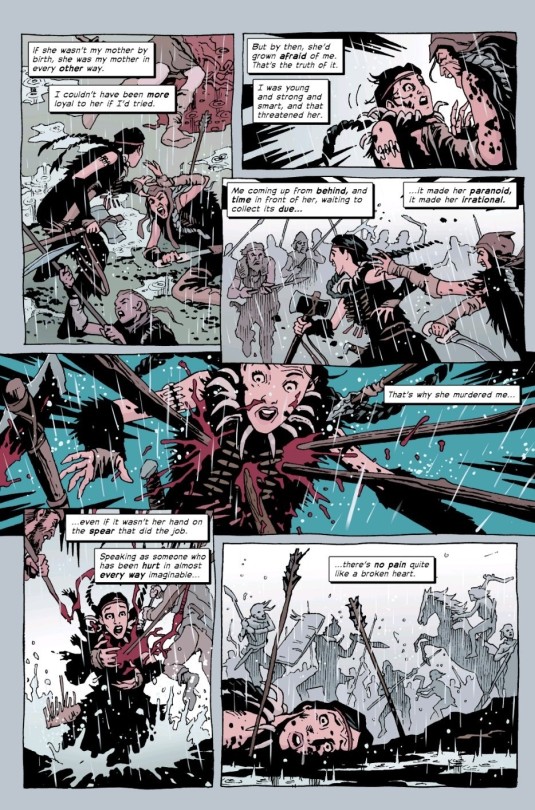
(Much of the stories focus is on Andy. I’ve noted it before, but Andy is our narrator, and a lot of the story is told via her flashbacks, over narration and POV. The comics really are Andy’s story, with the cast supporting around her.
We cut to modern day, of Andy, Nile. Nicky and Joe doing a job in California, USA. I believe the whole job revolves around taking down human traffickers, and in a couple parts. The job at the beginning has a shoot-out during the day, a car chase and then a stealth take down on a dock and shipping warehouse at night.

I just thought Andy looked cool here. Moving on.
Nile and Andy have a cool sportscar. Joe and Nicky have this very stylish *coughs* but exceptionally practical large van.
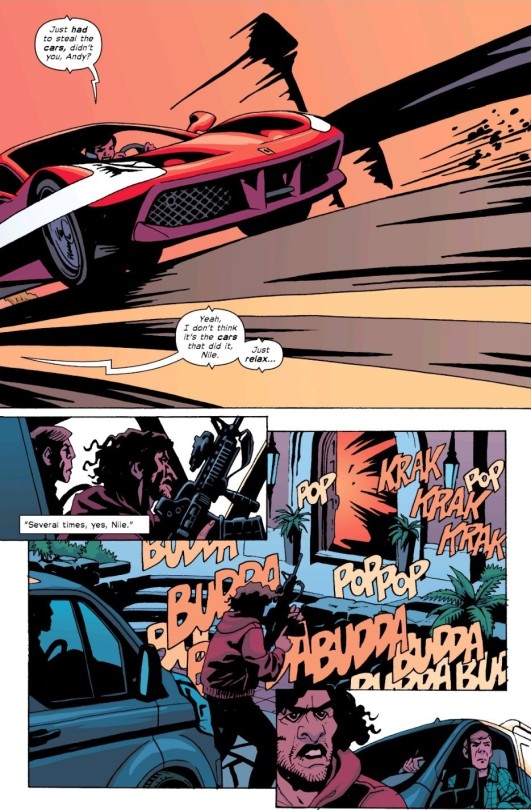
After the four of them take care of their day business, we cut to Booker being confronted in Paris by Noriko. Now the scene presented in the comics here is close to what we see at the end of the movie. Except this time it’s at night, and Noriko essentially kidnaps Booker. Since she wants to know where the others are, and Booker won’t tell her.

I’ll cut right to the chase. She uh. She tends to torture him. She’s got him on a heavy chain with a metal collar, and at one point drowns him over and over again to get him to talk. He never does, but she keeps him around anyway.
Around this time Agent King (Moose) appears, and then manages to come across Nile. Which leads to the infamous ‘stew of romance’ scene.
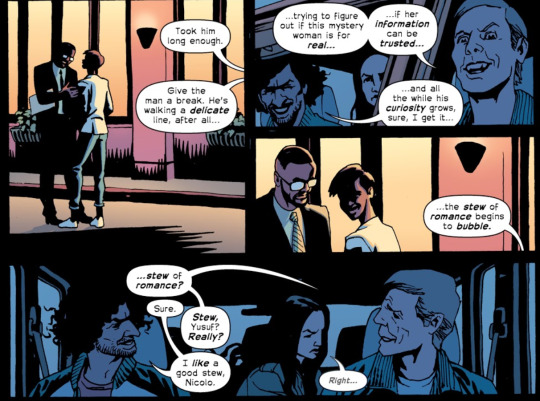
However. while Nicky and Joe are amused (and making bets on him asking her out).. (I love them)

Andy is not amused at all and loses her goddamned mind over it. To which she threatens to..spank Nile (????????) and Nicky and Joe basically tell her to calm down. (Andy’s worried that Nile befriending a mortal is going to end badly, and Nicky and Joe remind her that even if it does, they can’t just stop her. And that some things, Nile has to learn and adjust to herself. Nile is smart, and she’ll come to her own conclusions in time. Interfering isn’t right.
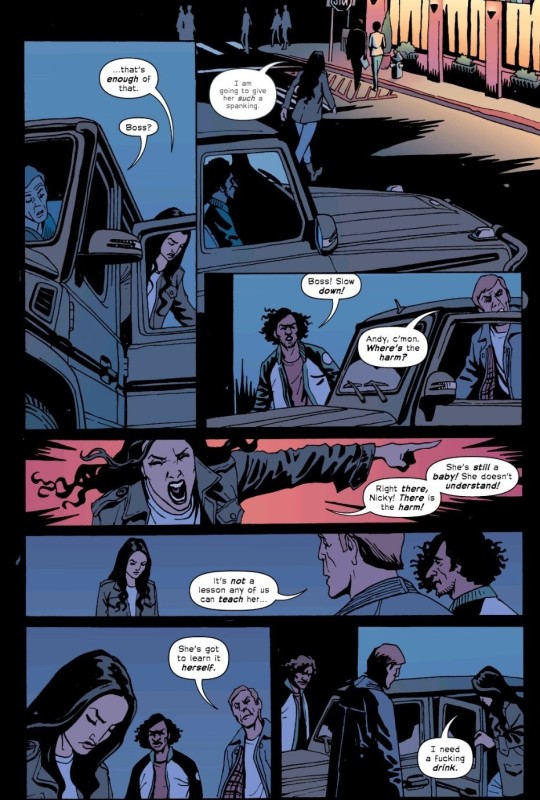
(They all look so sad in the bottom there, help me)
After this is the night mission at the warehouse docks.
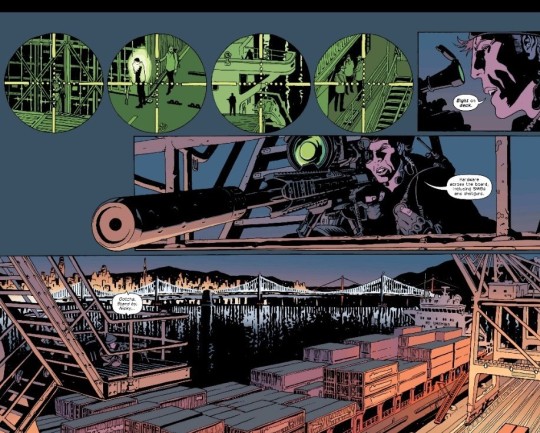
Another shot I just thought was cool. Nicky’s sniping shots are done really well.
After they finish, Noriko comes out of the actual blue to get them. Or well..attack them. Joe’s the first one to greet her, and all she does is comment about how he (Yusuf) hasn’t changed and shoots him. She shoots Nile and Andy as well. After both of them recover, Andy and Noriko start fighting, and Nicky puts a stop to it by shooting them both.
(It’s after Andy see’s Noriko that we get the first flashback from Andy to the ships, the same storm that ended up throwing Noriko overboard all those centuries ago and causing her time at sea).
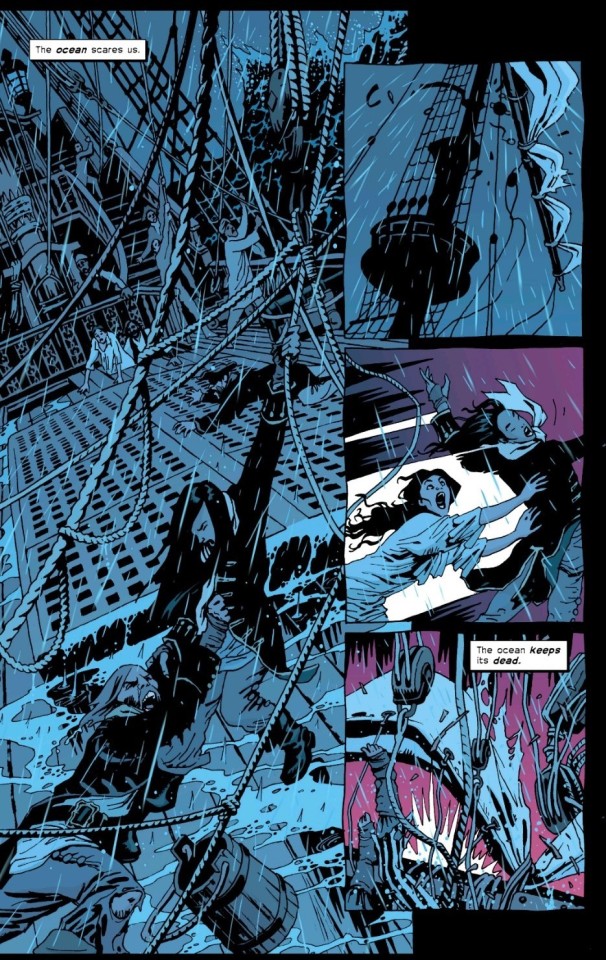
After Noriko and Andy revive from Nicky’s snipe shot, they split, leading us into the next day where Copley and Agent King (Moose, our new character) are surveying the damage at the warehouse and trying to decide what went down.
Copley already knows it’s the Guard, and is trying to explain this to Moose. I do kind of like this moment, where Copley comments to himself about Nicky being a good shot.
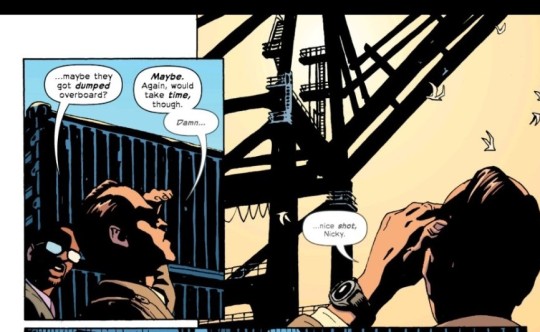
Hey-credit where credit is due and all.
Shortly after this, Copley falls on Nicky and Joe’s radar. And they quickly accost him at night. Which is far more satisfying than I thought it would be. A lot of the outcome with Copley and them does feel pretty good.
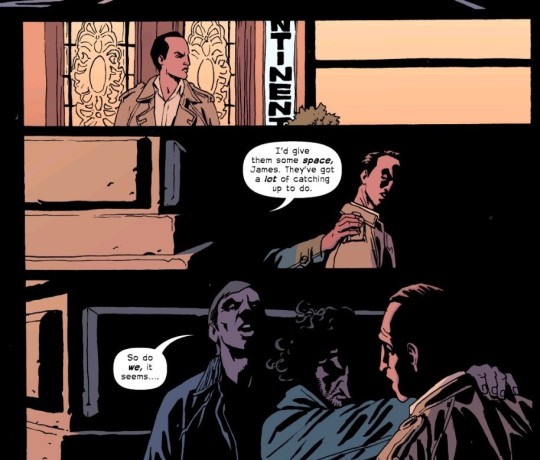
(Nicky’s scary face aside, I kind of love this shot, and this moment)
They don’t beat around the bush nor give him much leeway. They let him know-without preamble, that they’re pissed and his continued existence is on their good graces unless he explains himself.
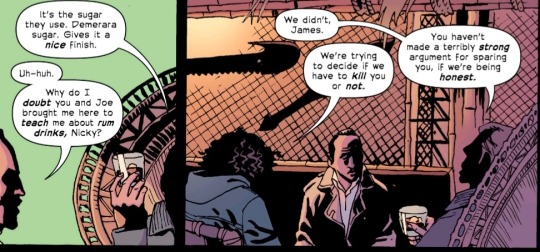
I have actually discussed this before (here-also has extra screencaps) so I won’t go too hard in detail on it. But I do love these scenes a lot. I like that they’re allowed to be as fuming angry as they have every right to be, and that they present Copley with no bullshit. Nicky and Joe are completely on the same page. And Copley is made aware of where he stands very quickly. This is where Copley presents them with the information he’d collected in his little self driven conspiracy adventure about them, and then drops the bomb that he knows Noriko has Booker.
Around this time, Andy has more flashbacks of Lykon and her old life..including participating in slave trading of humans. (Which comes back near the end) she also meets up with Norkio. Noriko’s main belief system at present is that, they are above humans *mortals* and there is no reason to behave otherwise. They have no need to stay on the same level as mortals when they’re not.
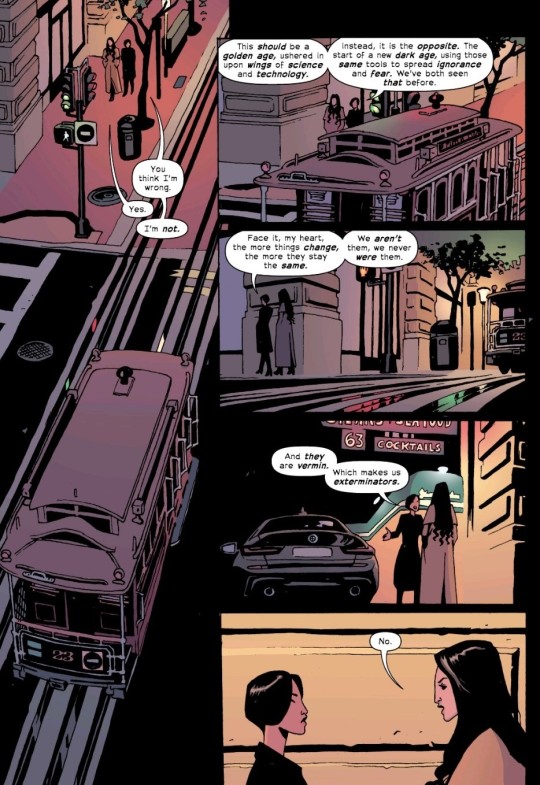
Also around this time Nile hooks up with Agent King.
Copley gives the information about how to track Booker and Noriko to a boat that Noriko is keeping him on and Andy and Nile join them up in the nick of time. This is also where Copley informs them about how Noriko has gotten her money-organized crime..and basically whatever she can get her hands on. Which is also how Noriko has her own personal army.

‘Fancy’ Joe please.
And for whatever reason, Copley seems to think ‘undercover/distracting’ means..being as stereotypically British as possible?
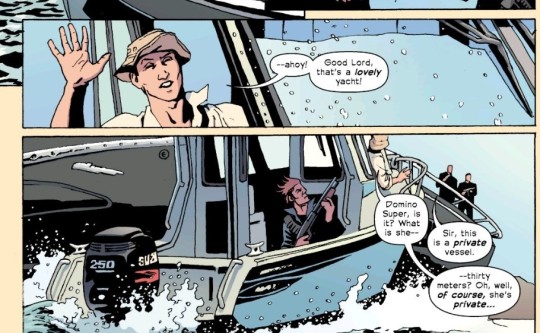
Though I’ll be honest, I mostly post this cap for how badass Nicky looks.
So! Everything culminates in the boat battle, and at the end, they get Booker back, and handle Noriko. Everyone goes back to a hotel to celebrate, and things are fine until Nile asks Andy about something Noriko had told her. She’d at one point accosted Nile, and told her to ask Andy about “Law 282″ which Andy reveals is the Code of Hammurabi. Which is how they all find out about Andy’s participation in slave trades. slavery etc. Back in her more..ancient warrior days. Nile, and the others are pretty appalled and Andy has a bit of a mental breakdown and explains that she can’t carry on anymore. She won’t. She can’t keep fighting, she can’t keep doing this. Which is when Nile tells them that they have to go.
They don’t really want to leave her, and ask her repeatedly to come with them-but she won’t. So they leave, even though Andy says she doesn’t want to be alone, they leave. (This is where I say, unless they physically forced Andy to come I don’t personally see what else they could have done without Andy fighting them, and probably figure that she’ll come around).
Next morning:
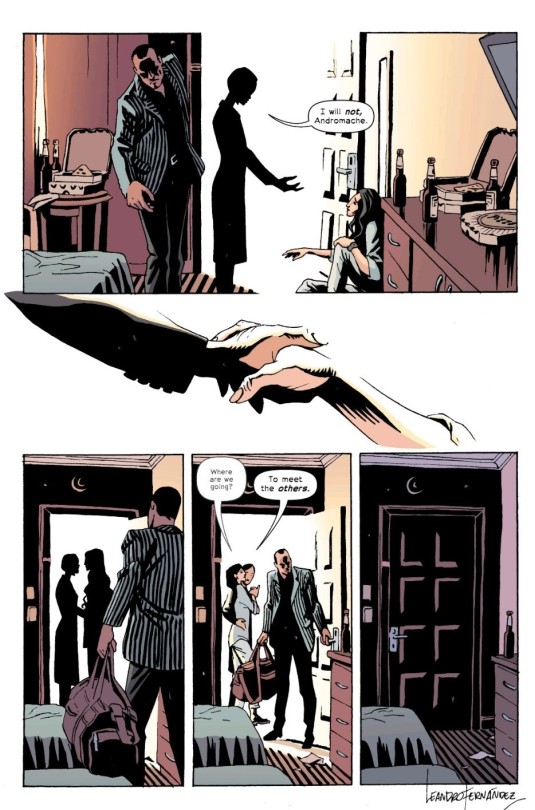
I’m not sure what ‘others’ Noriko is referring to here, but I personally think she set a lot of this up. She gave Nile that law to give back on purpose. I do wonder if it was part of a larger scheme on her end to alienate Andy from her team and swoop in, but I have no true proof of this beyond theory.
So that’s the basic summary of what happens.
Other Points:
Noriko vs Quynh
Noriko is very very much NOT Quynh, and I don’t believe the movie is going to act as such either. I’ve seen some *legitimate* concerns with having Quynh portrayed within the movie as she is in the comics, but given the complete difference between the tone of the movies, and the comics, I think that they’ve already set it up to be different. Personally, I’m not too concerned. I have a lot of faith in Gina Prince-Bythewood, and I can already sense where they’re probably going to make alterations.
Andy/Being Abandoned
Andy’s story has some issues. It’s not..great. It is legitimately hard to reconcile the Andy we know with her past, but I don’t see the ending as the team ‘abandoning’ her to the degree it’s presented. I think they FULLY intended to give her some time to cool off and get their bearings themselves, then come back for her. She keeps telling them she won’t come, but they absolutely do try. And everyone knows that nobody forces Andy to do anything Andy doesn’t want to do.
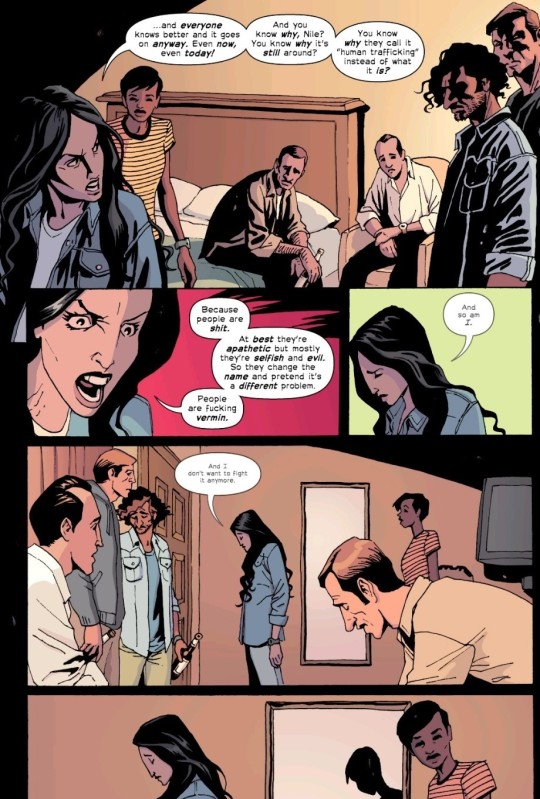
I mean, Idk, but these just..don’t look to be the faces of people who willingly want to leave her behind.
Just Because:
Nicky and Joe looking over Copley’s work. It’s sweet. Feat WWII Joe.
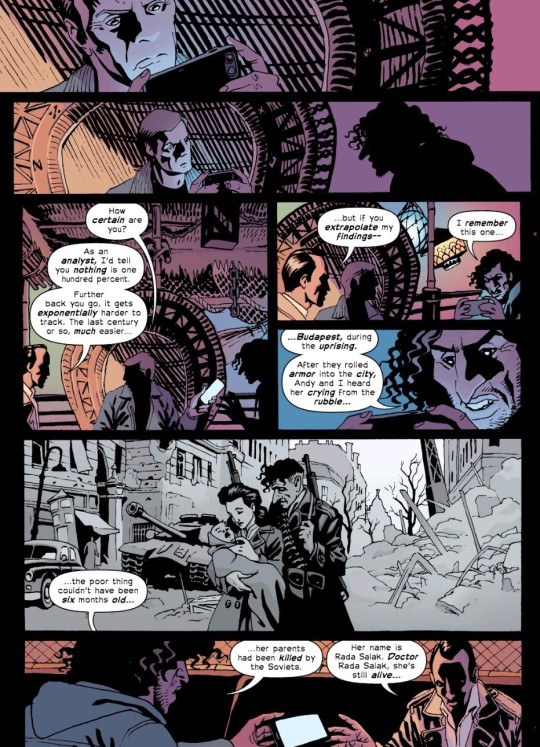
Final Thoughts
There are-without a single doubt, issues with the comics. I will never deny that. I do enjoy reading them, and I enjoy the dialogue a lot. (And Miwa’s absolutely incredible colouring). I think that there’s a definite difference in tone to them and that there are places where things could be expanded upon overall.
The comics are, as I’ve said before-Andy’s story. The other characters very much exist in support of her, and do not do a lot separately themselves. The movie is definitely more..family with them? Everyone’s personality in the comics is harsher overall. A little bit more dry and dangerous. There’s definitely less comradery with the team too and way less of a family vibe.
As characters, Nicky and Joe are very very similar to their movie counterparts, and I think they are written quite well. They seem to make decisions about what to do together, always appear on the same page *when we see them* and follow the same wavelength We get the sense that they’re completely in-sync. I also do like *though I did say it before* that they’re allowed to have the appropriate reactions and some resolution of what happened to them in Vol 1.
Nile still doesn’t feel as fleshed-out as she could be, so I’m really glad the movie put way more emphasis on her.
There’s some truly strong points in the dialogue-and I personally think dialogue and writing is one of Rucka’s strong points as a writer. Even if I still want to beg him to hire any type of historian whatsoever..and someone who can do math.
I sympathize with the math bit, this is why a helper would be good.
I’m going to wrap it up here, because holy moley this got LONG. If you’ve made it to the end, hi! Feel free to message me with any questions.
#the old guard#old guard comic#old guard comics#spoiler#spoilers#comic spoiler#comic spoilers#old guard comic spoiler#old guard comics spoilers#vol 2#old guard vol 2#force multiplied#the old guard force multipled#summary#overview#human trafficking mention#human trafficking mention tw#slavery mention#slavery mention tw#alcohol tw#alcohol#please let me know if more tags are required
33 notes
·
View notes